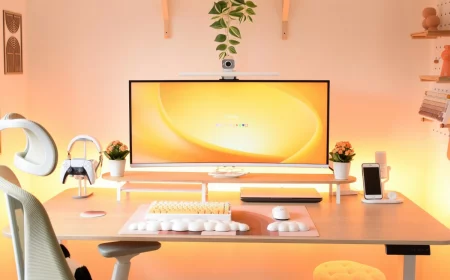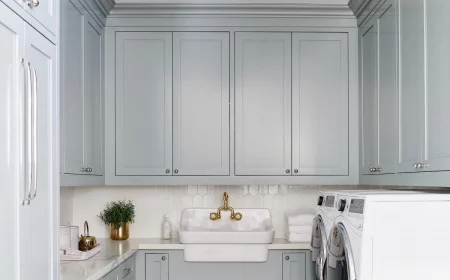Your Home Office Isn’t Working. Here’s How to Actually Fix It.
So, you’ve got a home office. Maybe it’s a dedicated room, or maybe it’s just the corner of your living room. But let’s be honest, is it really working for you? I’ve spent years in the trenches helping people turn dysfunctional spaces into productivity powerhouses, and I’ve seen it all. The biggest mistake isn’t about choosing the wrong paint color—it’s about skipping the foundation.
In this article
A truly effective home office is a tool. It’s a space designed to support your health, your focus, and ultimately, your work. While those picture-perfect offices online are nice to look at, a pretty plant won’t fix a setup that’s actively working against you.
If you get the core principles of layout, ergonomics, and lighting right, the style will naturally fall into place. Get them wrong, and you’ll spend every day fighting your own workspace. This guide cuts through the fluff and gives you the professional techniques that make a real difference.
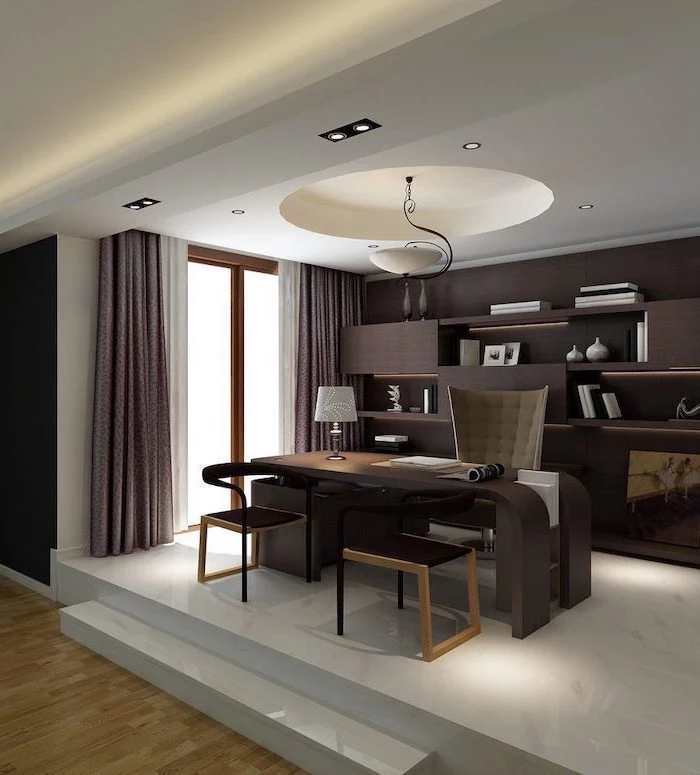
First Things First: Claiming Your Territory
Before you even think about browsing for furniture, you need to get real about your space. The location you choose is the single most important decision you’ll make, and a bad one can sabotage even the best gear.
Find a Low-Traffic Zone
The dream, of course, is a separate room with a door you can close. That door is more than just a piece of wood; it’s a mental boundary. When it’s shut, you’re at work. When you open it to leave, you’re home. This separation is crucial for avoiding burnout, because when your work is always in your line of sight, it’s always calling to you.
But hey, not everyone has a spare room. If that’s you, your mission is to find the most low-traffic spot you can. Avoid placing your desk in a main hallway or right beside the kitchen—the constant foot traffic and noise will absolutely shred your concentration. A corner of a dining room or guest bedroom is a much better bet.
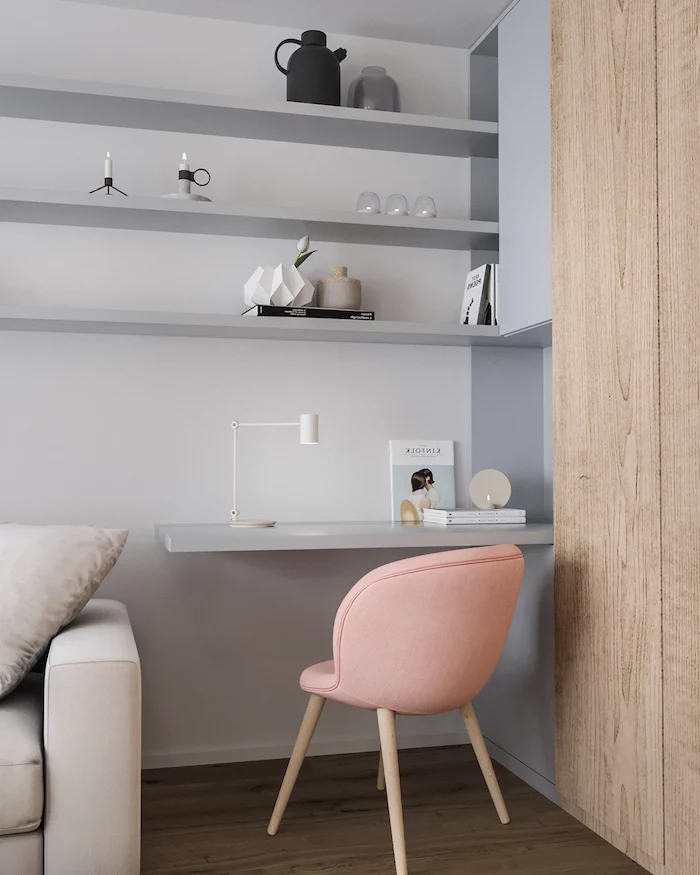
Oh yeah, get creative! Look for nooks, weird spots under the stairs, or even large closets. One of the best offices I ever helped set up was in a former walk-in closet. Before, the client’s work was spread all over the dining table, driving his family nuts. Afterward, with some good lighting and ventilation, he had this tiny, silent pod of pure focus. The best part? The whole conversion cost less than a new desk because we just used a simple countertop from a hardware store for the work surface.
Map It Out Before You Buy
Okay, you’ve found your spot. Don’t open that Amazon tab yet. Grab a measuring tape and a roll of painter’s tape. Seriously, this five-minute exercise can save you hundreds of dollars and a world of frustration.
Tape the outline of your future desk and chair right onto the floor. A common mistake is buying a massive desk that looks great online but leaves you with zero room to move. You need at least three feet of clearance behind your chair to scoot back without feeling trapped. Once you’ve taped out the main items, walk around the space. Can you get to your filing cabinet without a struggle? Does the flow feel natural? It’s much easier to adjust tape than it is to return a 150-pound desk.
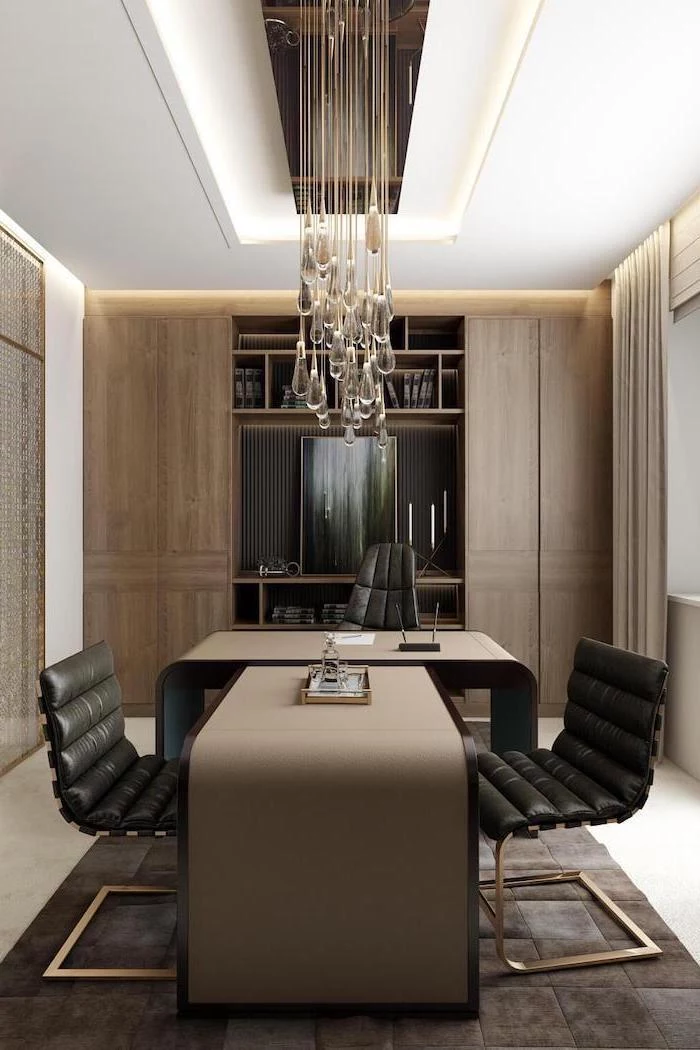
The Ergonomic Core: How to Not Wreck Your Body
Let’s talk about ergonomics. It sounds like a boring technical term, but it’s really about fitting your workspace to your body, not forcing your body to fit your workspace. A bad setup can lead to very real back pain, neck strain, and wrist issues. Think of good ergonomics not as a luxury, but as a non-negotiable business expense that protects your ability to earn a living.
Quick Tip: If you’re on a tight budget, here’s the biggest bang-for-your-buck upgrade you can make. Get a separate keyboard, mouse, and a laptop stand. This setup can cost less than $75 and it instantly fixes the “laptop hunch” that causes so much neck and shoulder pain.
Your Chair: The Most Important Tool You Own
If you’re going to splurge on one thing, make it your chair. You will spend thousands of hours in it, and a dining chair just won’t cut it. To be frank, a cheap task chair from a big-box store often isn’t much better.
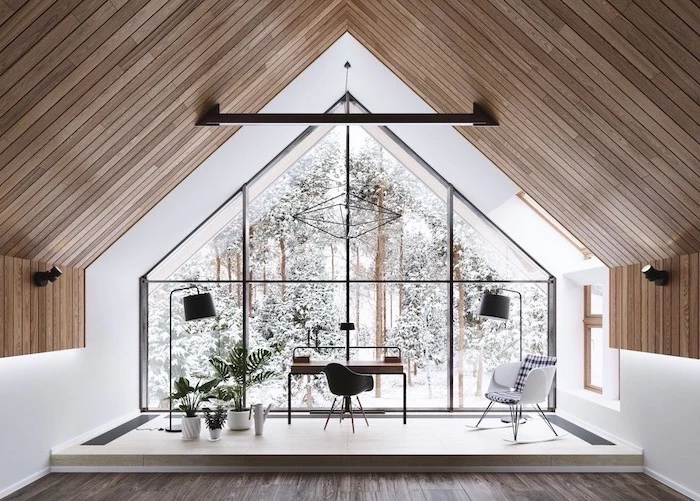
Here’s what to look for in a real ergonomic chair:
- Seat Height: Your feet should be flat on the floor, with your thighs parallel to the ground.
- Seat Depth: When sitting all the way back, you should have a gap of about two or three fingers between the edge of the seat and the back of your knees. This is key for good circulation.
- Lumbar Support: The back of the chair needs to support the natural curve of your lower spine. Good chairs have adjustable support you can move up and down to fit you perfectly.
- Armrests: These should be set so your shoulders are relaxed and your forearms are parallel to the floor. Most people set them way too high, which leads to tense shoulders.
Look, a brand-new, top-tier commercial chair can run you $1,500 or more, which is out of reach for most people. But you don’t have to spend that much. The sweet spot for a fantastic, fully adjustable ergonomic chair is often in the $300 to $500 range. You can also find incredible deals at used office furniture dealers in your city. Just be wary of “gaming chairs”—they often prioritize flashy looks over the proven ergonomic support that will save your back.
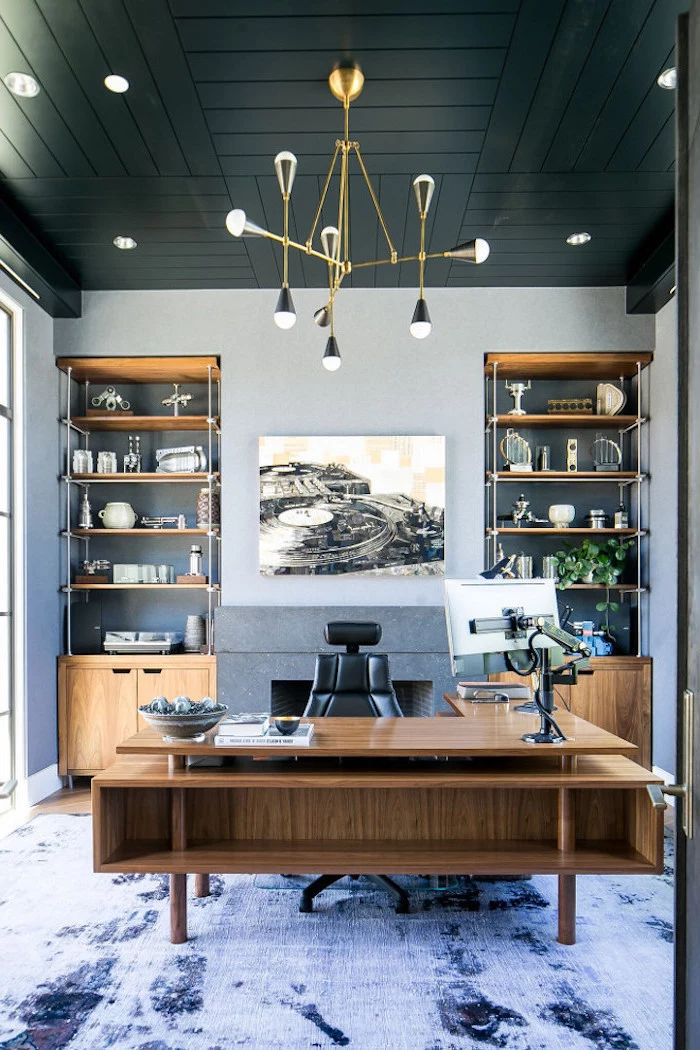
Your Desk: It’s All About the Height
Most standard desks are about 29-30 inches tall, which is designed for someone who’s around 5’9″. If you’re taller or shorter, that desk might be working against you. The rule is simple: when sitting in your properly adjusted chair, your forearms should be parallel to the floor when your hands are on the keyboard, with your wrists straight.
An adjustable-height (sit-stand) desk is an amazing investment for both ergonomics and energy levels. And they aren’t the crazy luxury they used to be. You can find solid manual crank versions for under $250, and good motorized ones often start in the $300 to $500 range.
Let There Be (the Right) Light
Bad lighting is a sneaky productivity killer. It causes eye strain, headaches, and that classic 3 PM slump. The pros approach lighting in three layers, and you should too.
But first, a quick cheat sheet for when you’re buying bulbs. There are three numbers that matter:
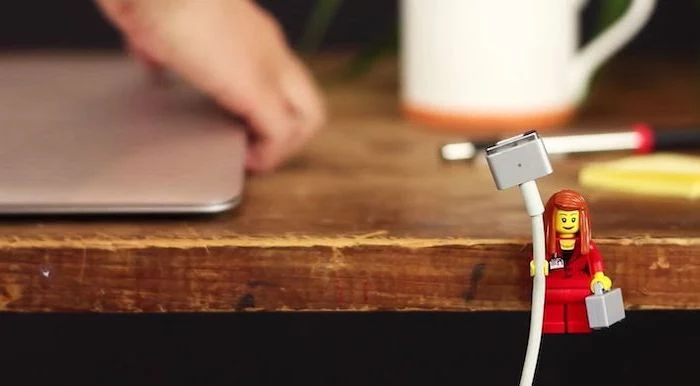
- Lumens (Brightness): For a typical 10×10 foot office, you want a total of about 5,000 lumens for good, energetic light.
- Kelvin (Color): This is how warm or cool the light feels. For a workspace, look for a neutral-to-cool white, around 4000K to 5000K. It mimics daylight and promotes alertness.
- CRI (Color Accuracy): The Color Rendering Index tells you how true colors will look under the light. Aim for a CRI of 90 or higher.
Good to know: When you’re at the hardware store or searching online, here’s a magic phrase to find the perfect bulb for your desk lamp: “A19 LED Bulb, 100W equivalent (around 1500 lumens), 4000K, 90+ CRI”.
The Three Layers of Light
- Ambient Light: Your room’s main light, usually from a ceiling fixture. It should provide a good, even base layer of light.
- Task Light: This is your desk lamp. It needs to light up your work area without causing glare on your monitor. An adjustable-arm lamp is your best friend here.
- Accent Light: This is for vibe—a small lamp on a bookshelf or a light on a piece of art. It adds depth and personality.
By the way, if you have a window, use it! But be strategic. The best spot for your desk is where the window is to your side. This gives you nice, indirect light without causing horrible glare on your screen or straining your eyes.
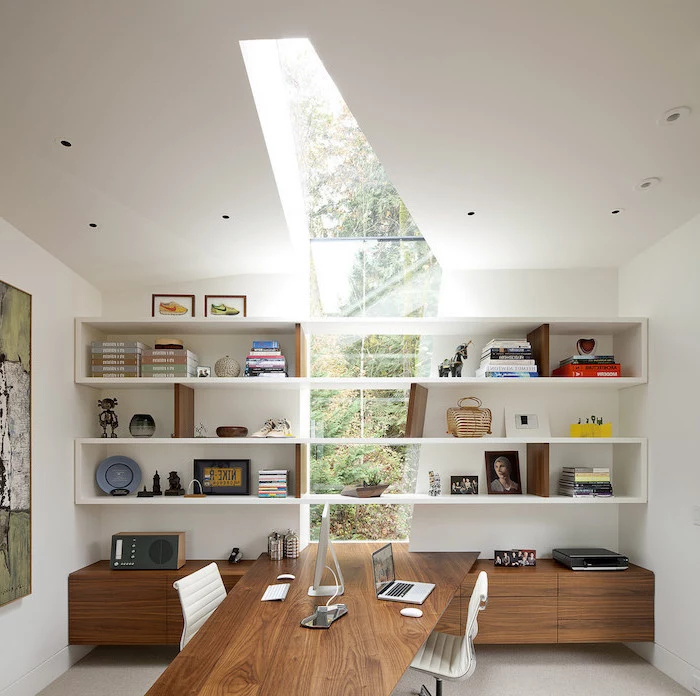
Taming the Chaos: Systems for a Clear Mind
Clutter is just a pile of postponed decisions, and it’s constantly stealing your focus. A few simple systems can make a world of difference.
Conquer the Cable Monster
A nest of tangled cables under your desk looks messy and collects dust. You can fix this for good. To finally tame that cable monster, head to a hardware store or go online and grab these three things for under $40 total:
- A pack of velcro cable ties. Infinitely better than zip ties.
- A J-Channel cable raceway. This is a plastic channel with an adhesive back that you stick to the back or underside of your desk to hide cords.
- A surge protector you can mount. Getting the power strip off the floor is a game-changer.
Think Vertically for Storage
Your desk surface is prime real estate. Stop using it for storage. Install wall-mounted shelves or a tall, narrow bookcase to get binders, books, and supplies off your desk but still within easy reach. It frees up your workspace and can even make the room feel taller.
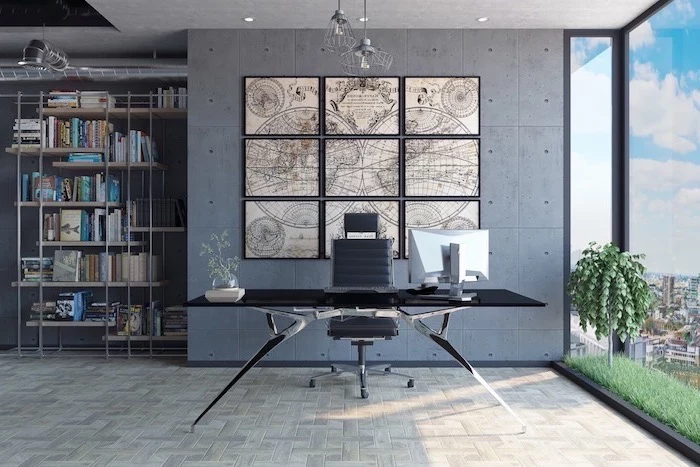
The Vibe: Using Psychology to Your Advantage
Your environment sends constant signals to your brain. You can use this to your advantage to stay focused and calm.
Noise is the Enemy
Hard surfaces like bare walls and hardwood floors bounce sound around, creating distracting echoes. The solution? Soft surfaces. An area rug, some curtains, and even a fabric pinboard can absorb a surprising amount of noise. A full bookshelf is also a fantastic sound diffuser. A client of mine in a noisy apartment found that adding a thick rug, heavy curtains, and a couple of large canvas art prints dramatically cut down on the background noise from neighbors.
Personal, Not Cluttered
Your office should feel like yours, but there’s a fine line between personalization and clutter. A family photo, a favorite mug, a healthy plant—these are great. They ground you and reduce stress. Just choose one or two things that truly make you happy and keep the rest of your desk surface clear for what it’s meant for: work.
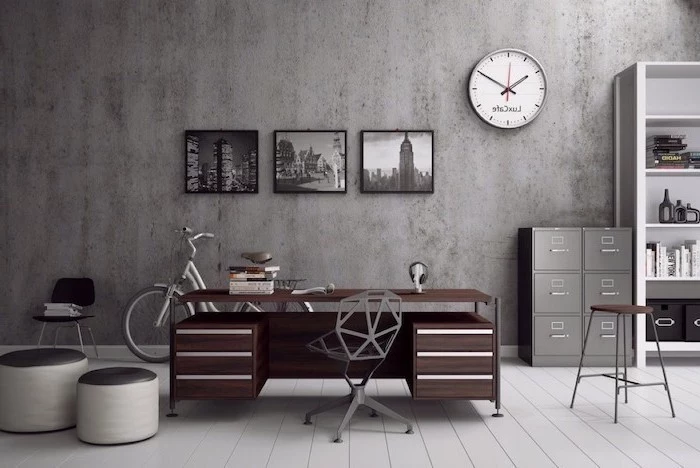
When You Need to Call in the Pros
This guide will get you 90% of the way there. But sometimes, you need a specialist. Your health and safety are worth it.
- For Your Health: If you have chronic pain or a specific medical condition, a certified professional ergonomist or physical therapist can give you a personalized assessment that’s far beyond general advice.
- For Your Safety: Heads up! Any work involving new wiring or moving outlets requires a licensed electrician. Faulty wiring is a major fire hazard. Don’t even think about DIY-ing it.
- For Your Home: Planning to knock down a wall? You need a qualified contractor to make sure you don’t mess with your home’s structure and to handle any necessary permits.
At the end of the day, building a great home office is a serious investment in your career. When you focus on these foundations, you create more than just a place to park your laptop. You build a space that truly supports you in doing your best work, day in and day out.
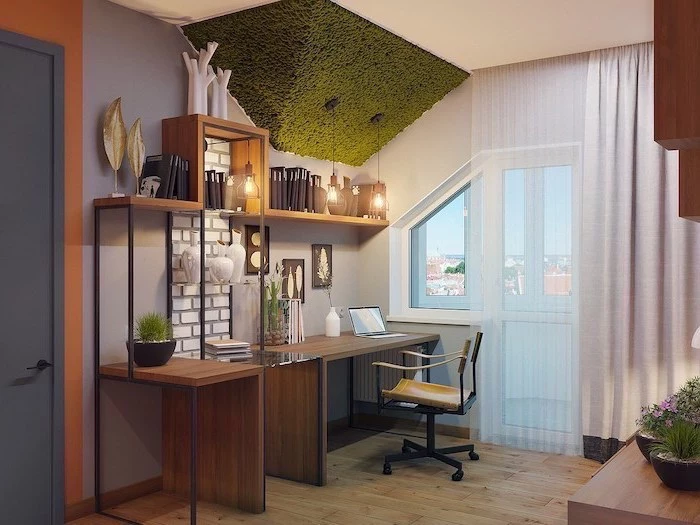
Inspiration Gallery
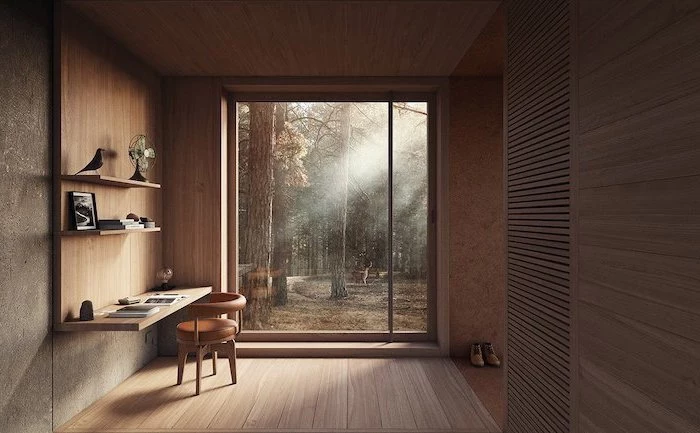
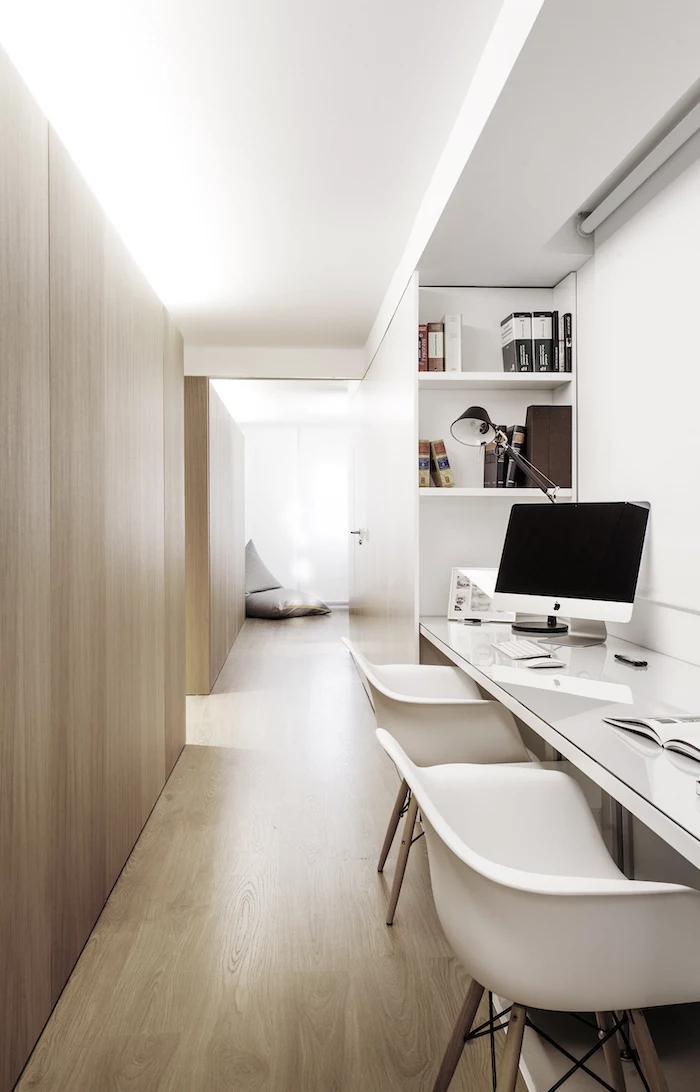
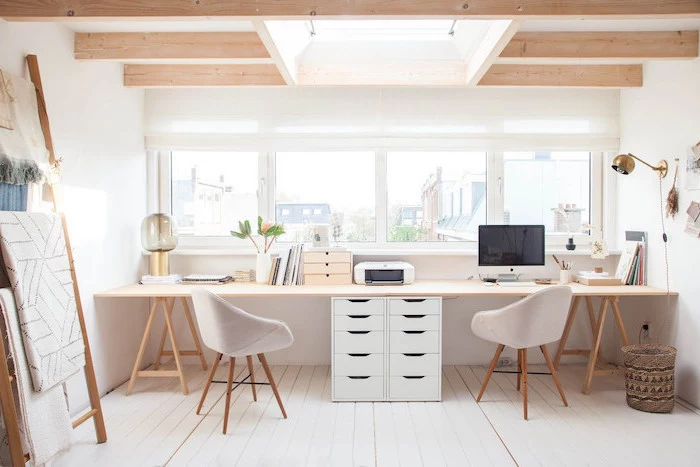
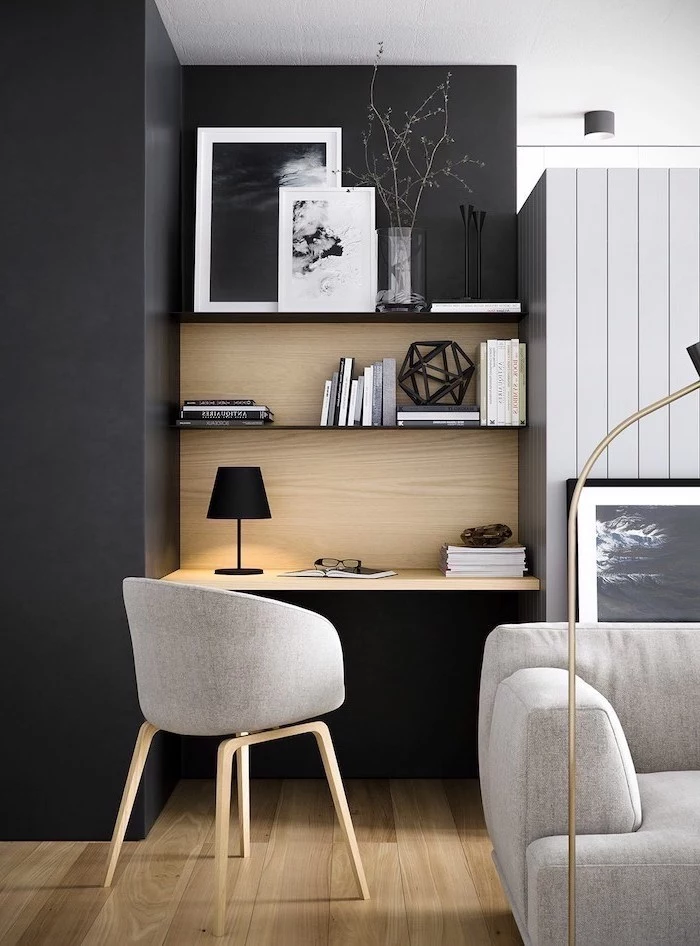
The 20/20/20 Rule: It’s not about your furniture, but how you use it. To combat digital eye strain, every 20 minutes, look at something 20 feet away for at least 20 seconds. Position your desk to face a window or a distant point in your room to make this a natural habit.
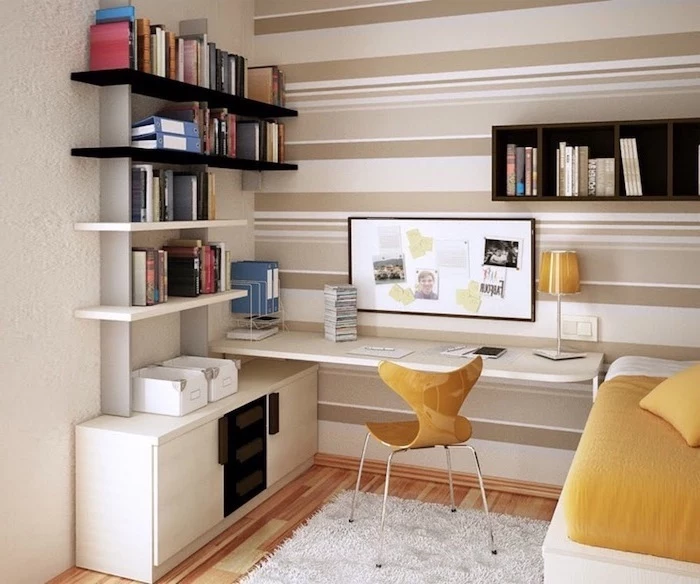
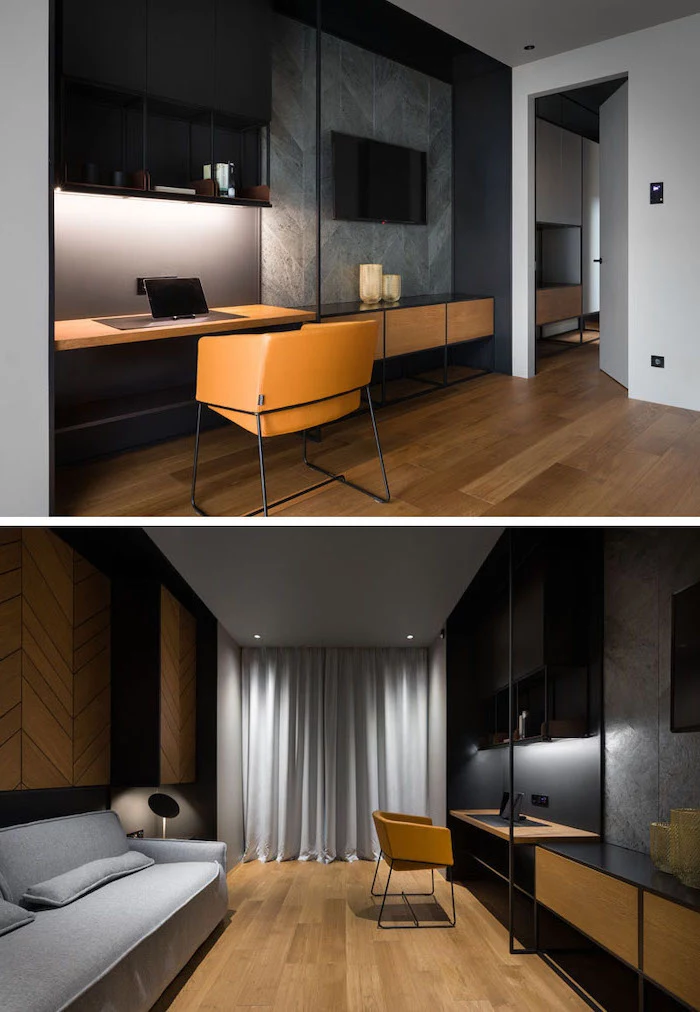
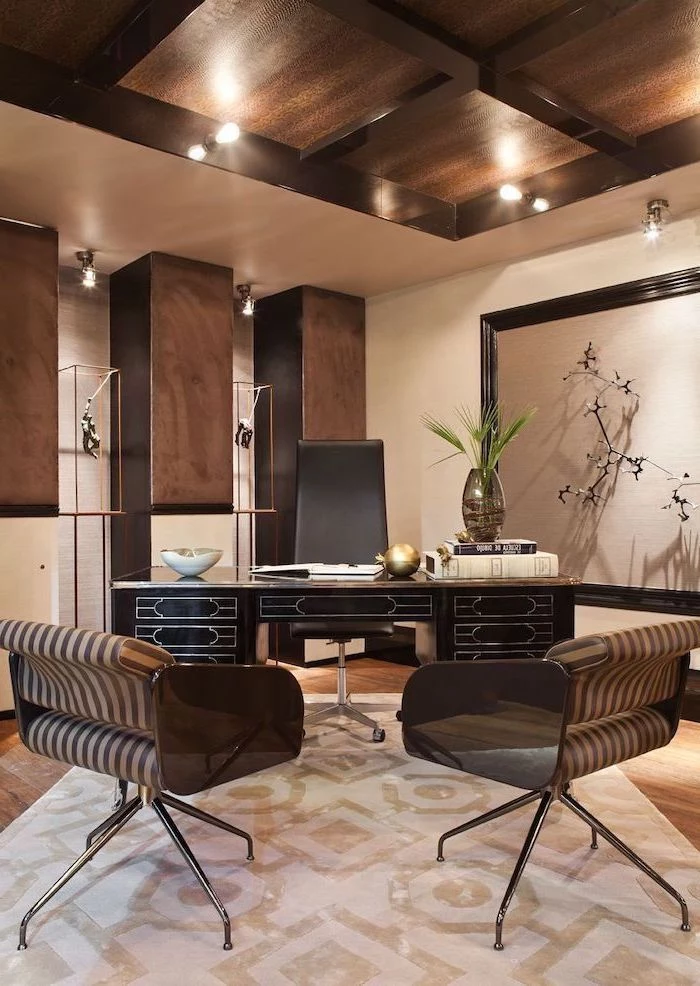
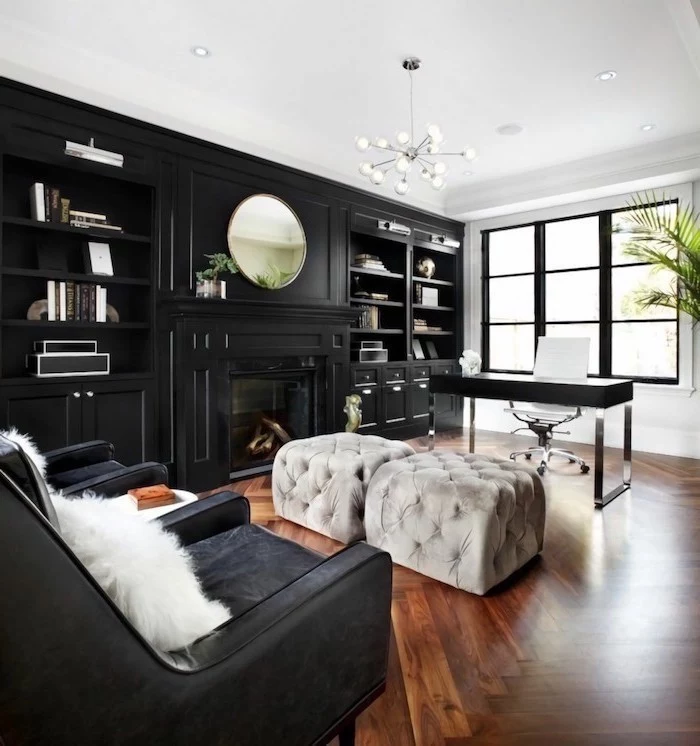
- Keeps your desk surface clear for essential tasks.
- Elevates your screen to the correct ergonomic height.
- Makes cleaning your workspace a breeze.
The secret? Vertical space. Use wall-mounted shelves like the minimalist EKBY JÄRPEN from IKEA or floating shelves for a sleek look to get books and supplies off your desk.
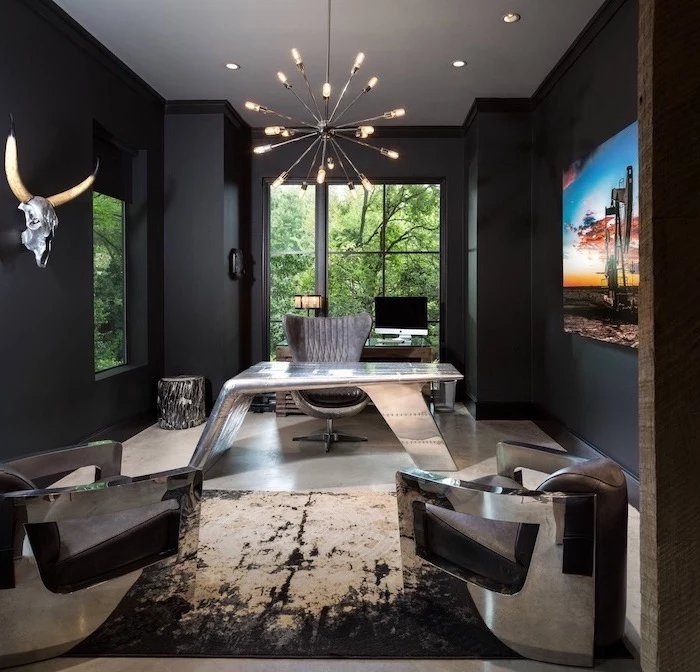
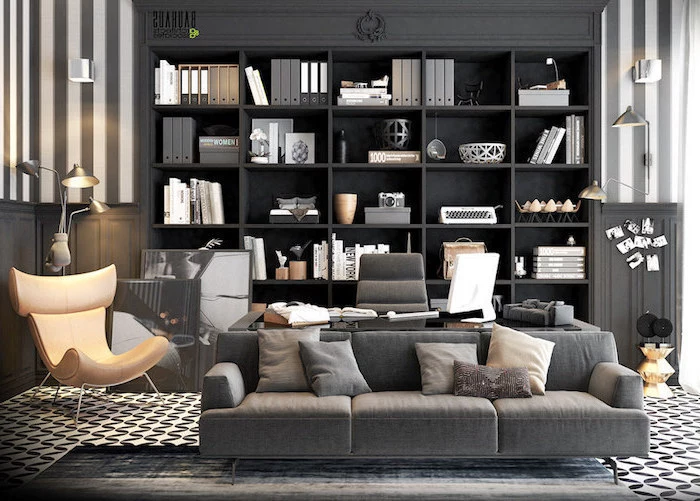
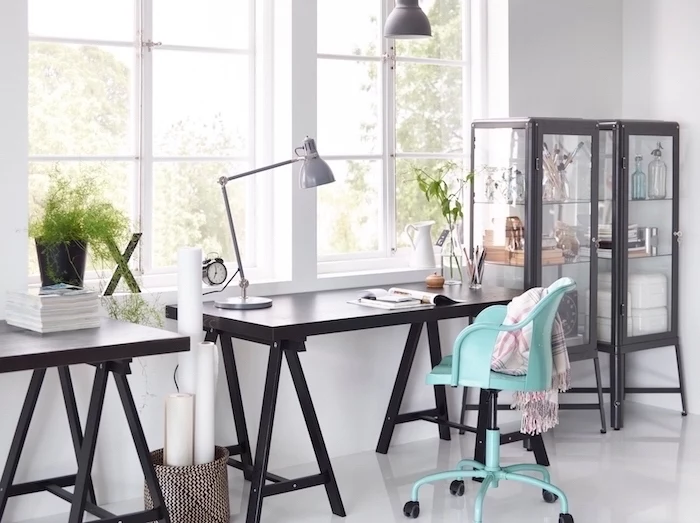
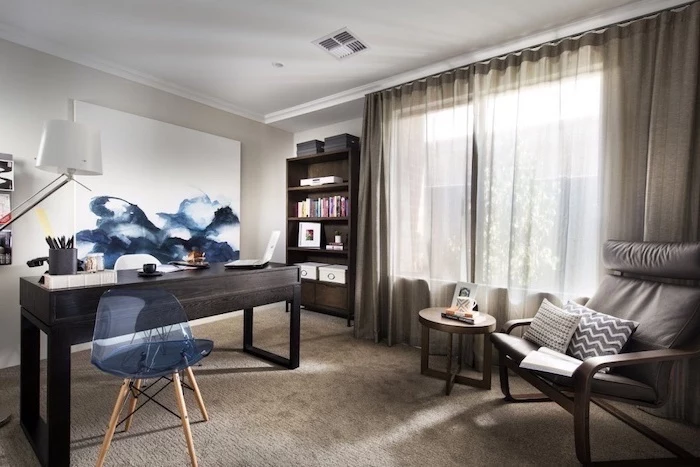
A study by Gensler Research Institute revealed that the most significant factor for workplace effectiveness isn’t collaboration or socializing, but an individual’s ability to focus.
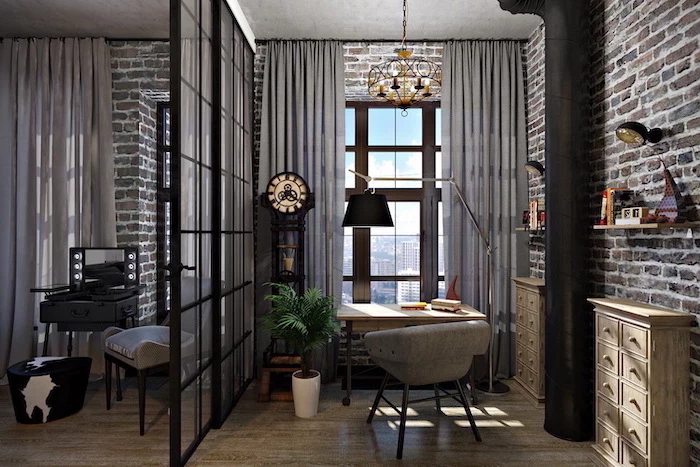
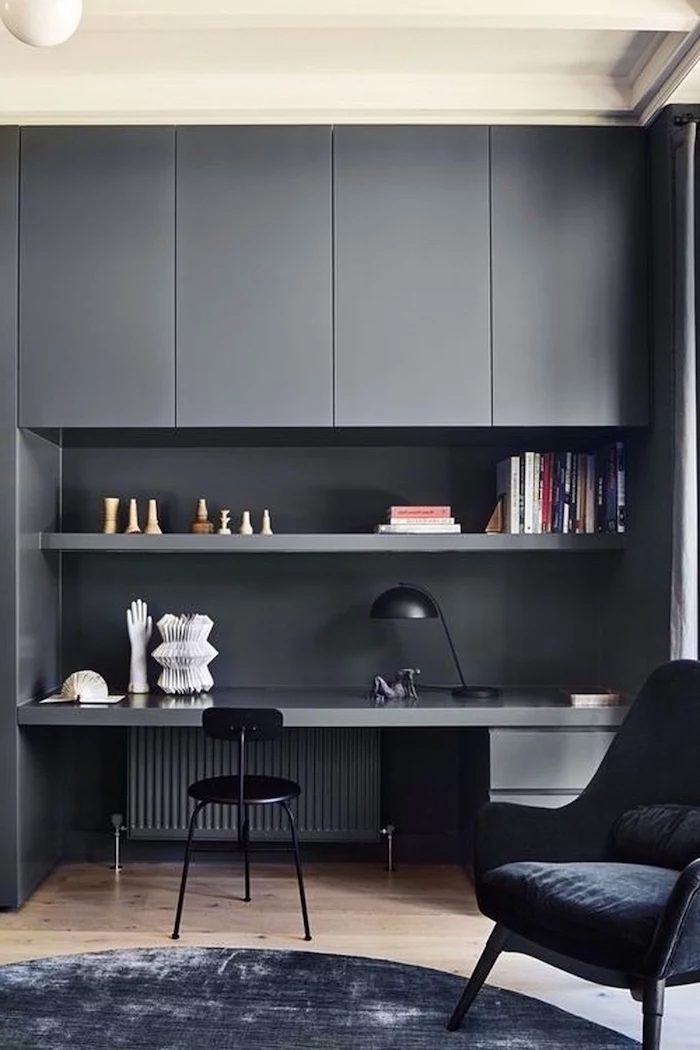
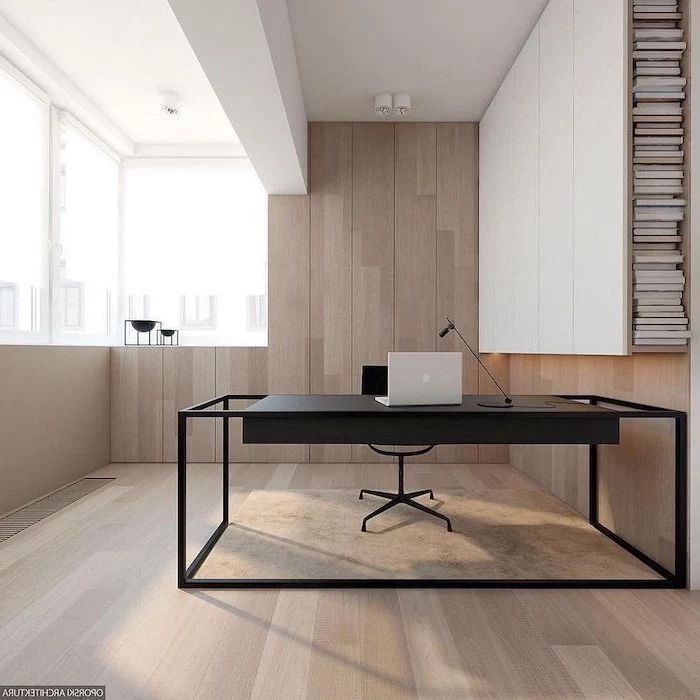
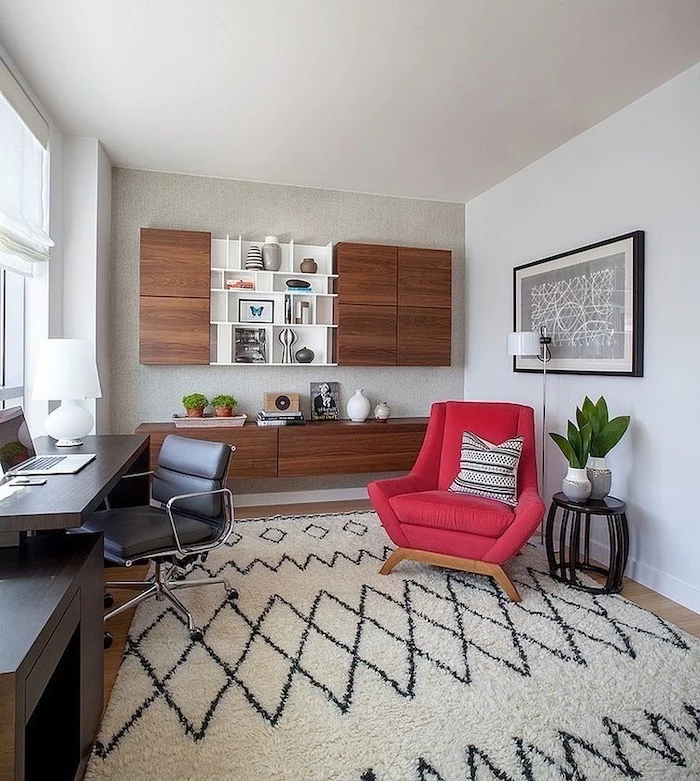
Can a rug really improve my home office?
Absolutely. Beyond adding warmth and style, a rug helps define your workspace within a larger room, creating a psychological boundary. More practically, it absorbs sound, reducing echo during video calls—a subtle but significant upgrade for professionalism.
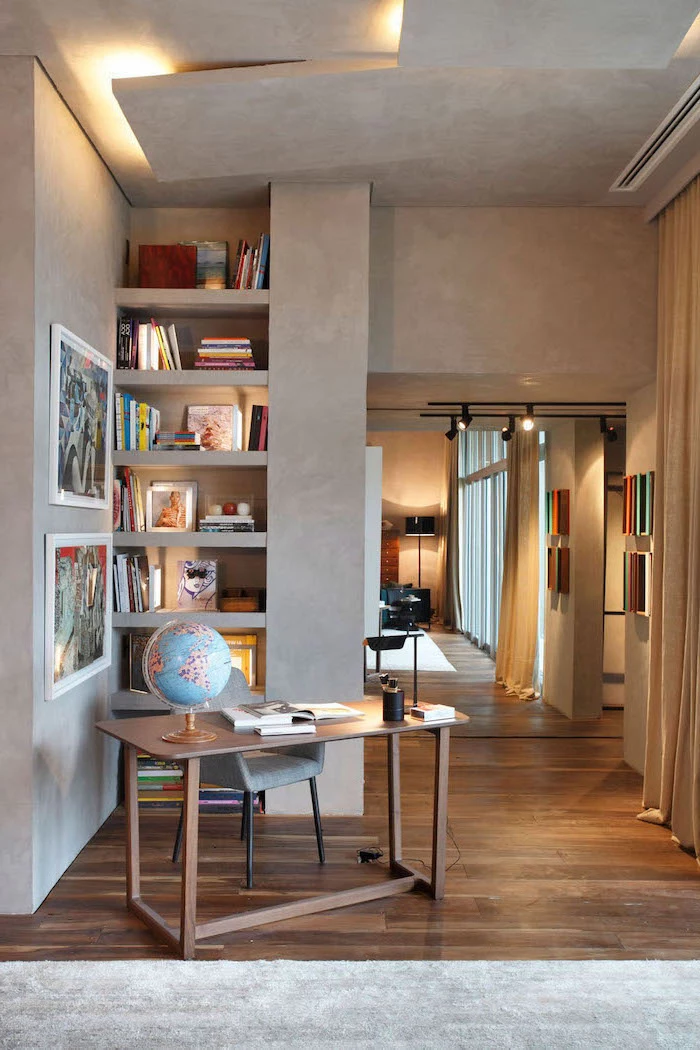
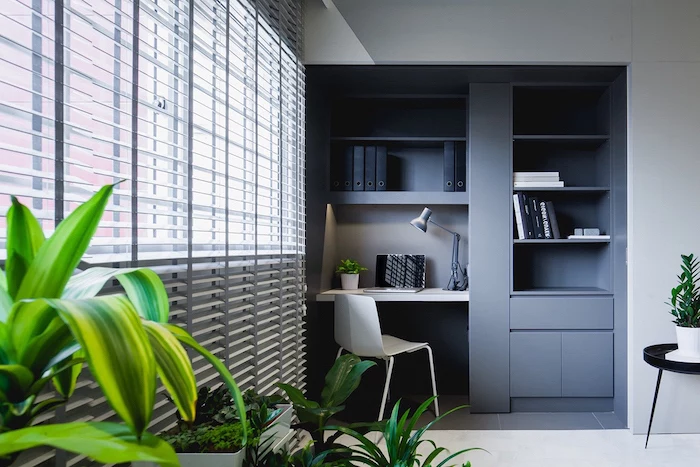
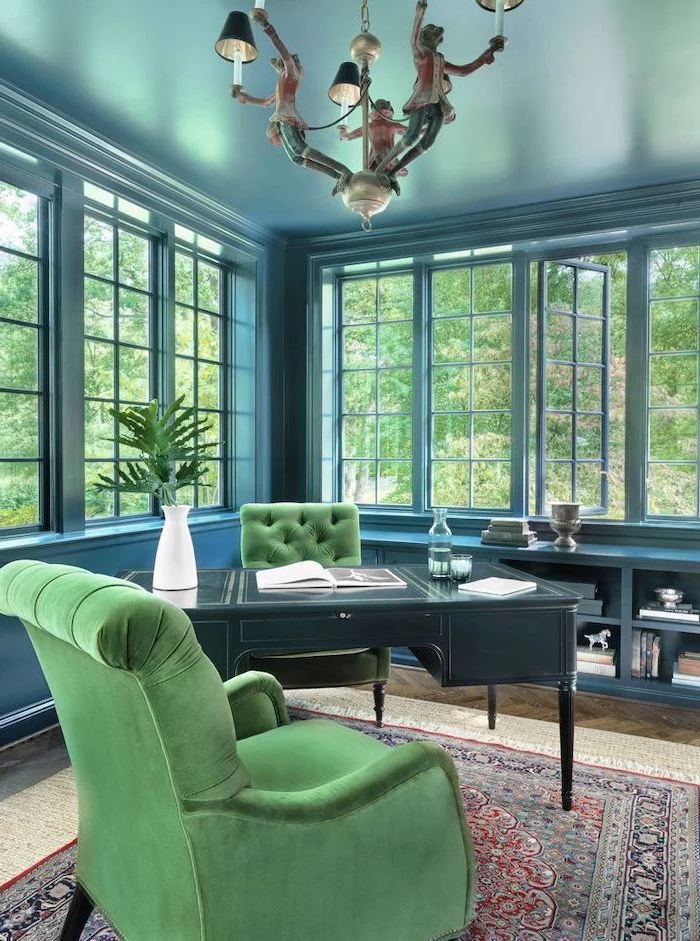
Don’t underestimate the power of texture. While a sleek, minimalist desk is great for focus, the space can feel cold. Introducing contrasting materials like a worn leather mousepad, a wool felt desk mat from Grovemade, or a ceramic pen holder adds tactile richness and makes the space feel more personal and grounded.
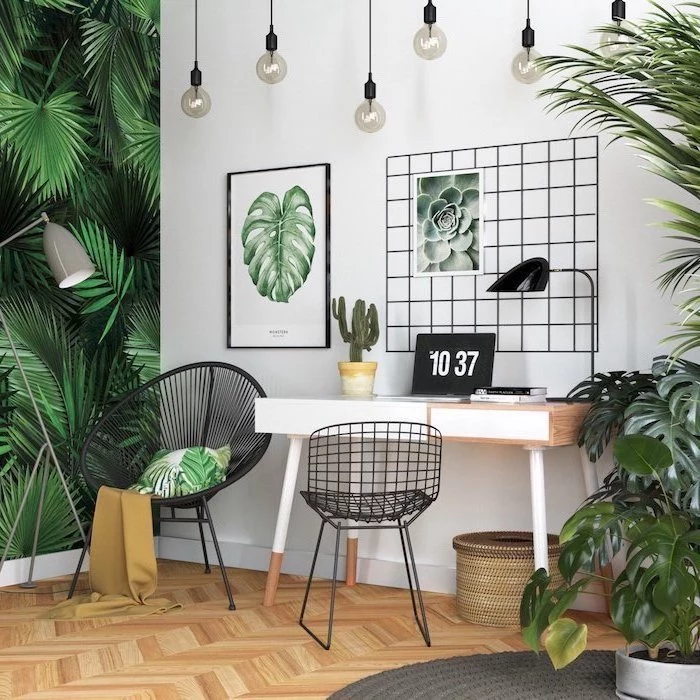
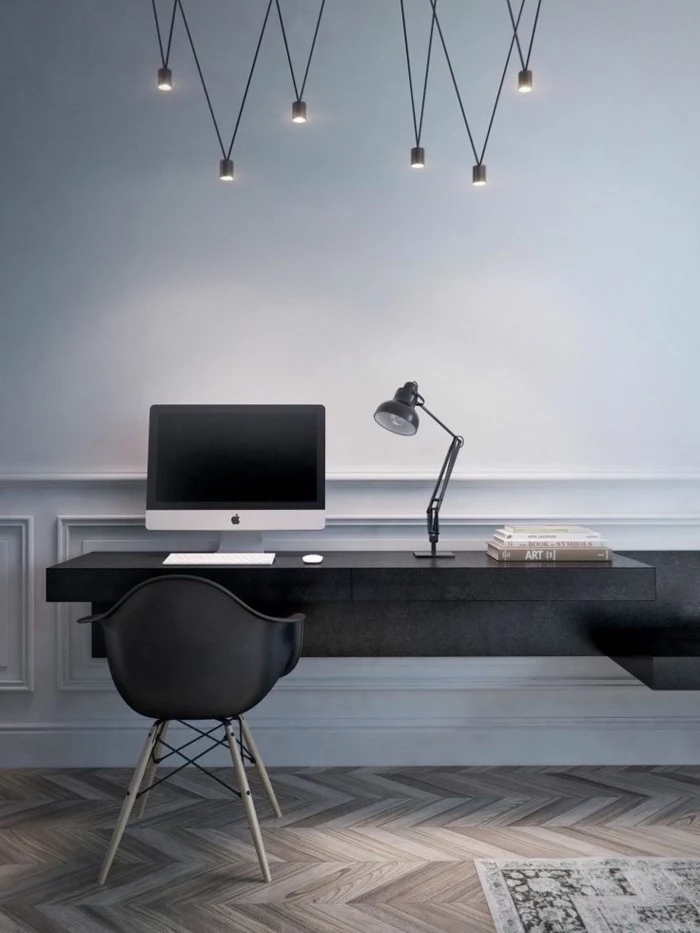
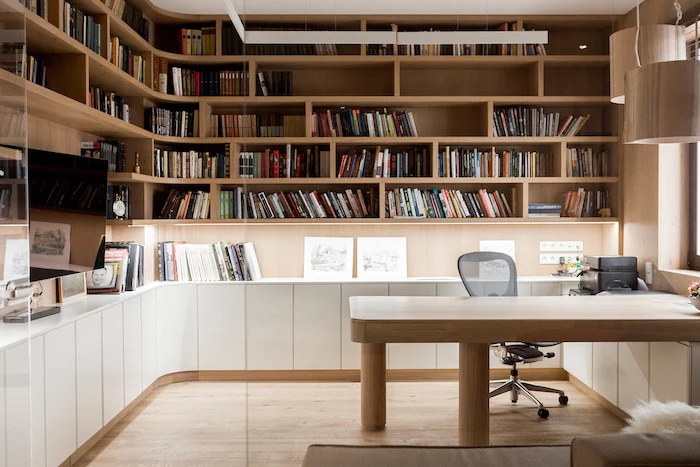
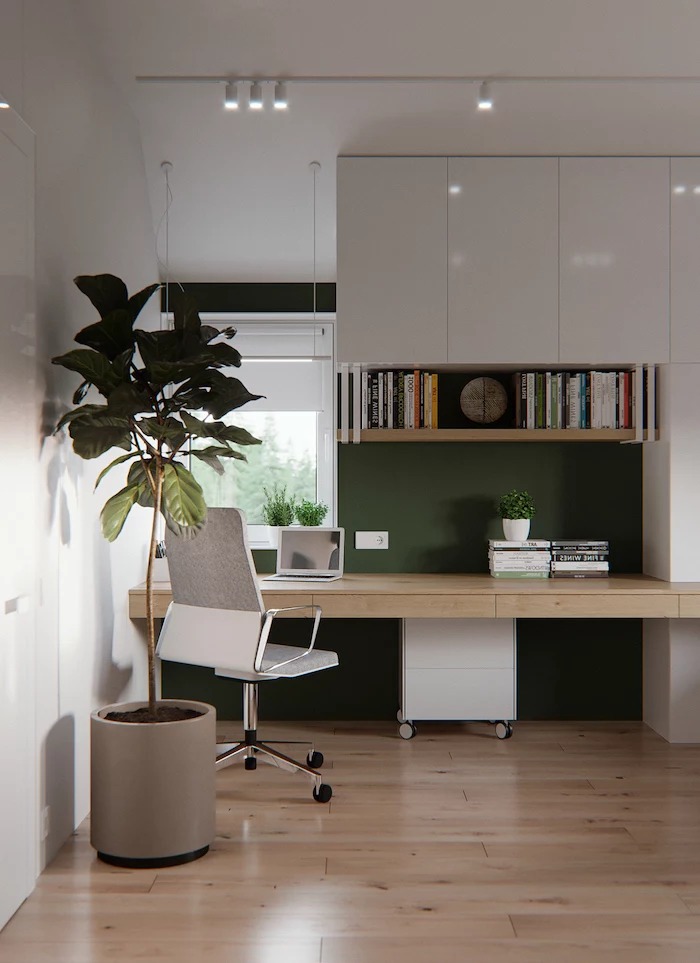
Ergonomic Chair: The gold standard, with adjustable arms, height, and lumbar support. Models from Herman Miller or Steelcase are investments in your health.
Dining Chair: The most common mistake. It’s built for short-term sitting and typically lacks any support, leading to slouching and back pain.
Even a dedicated office chair on a budget is a better choice than repurposing a dining chair.
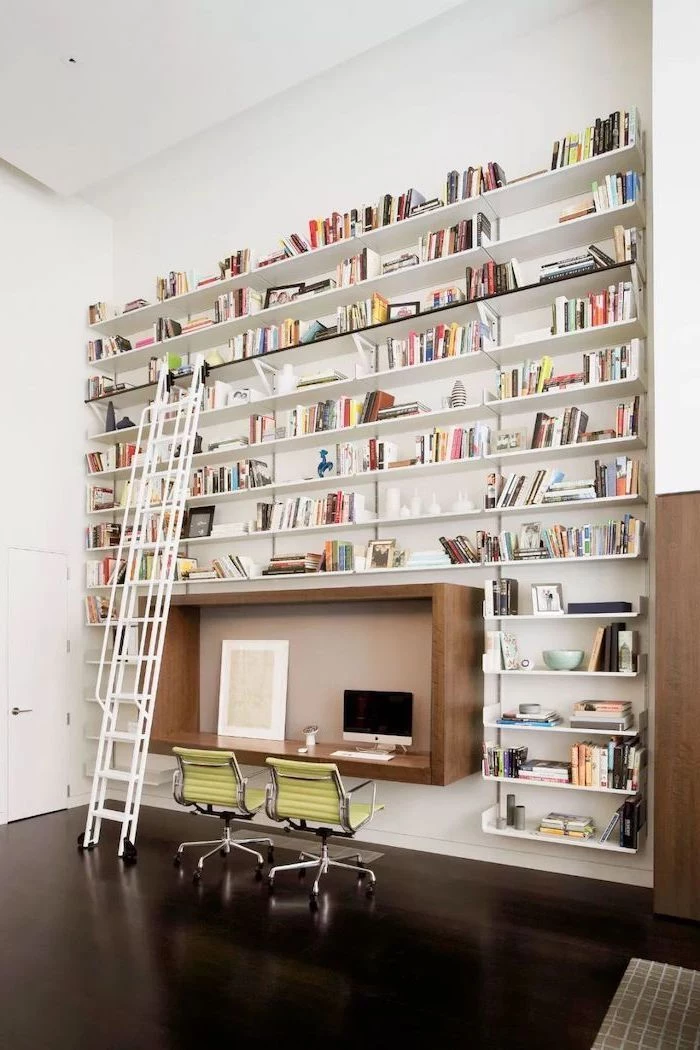
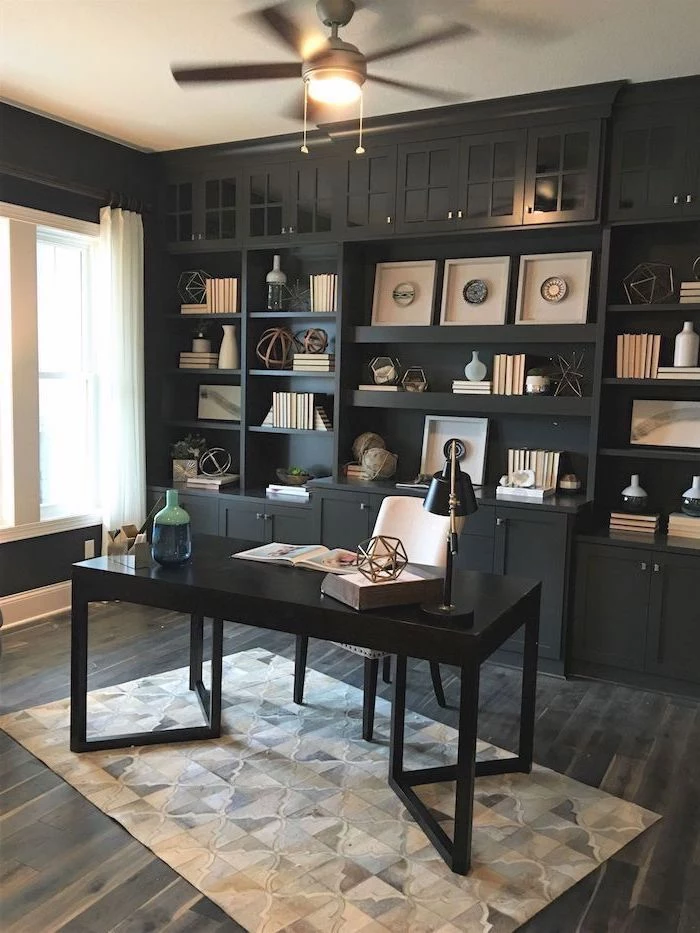
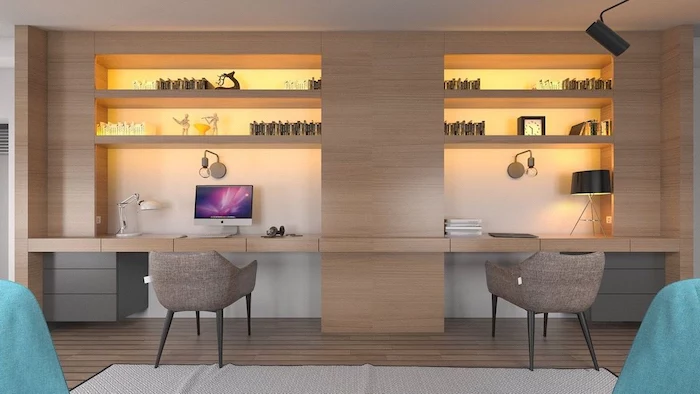
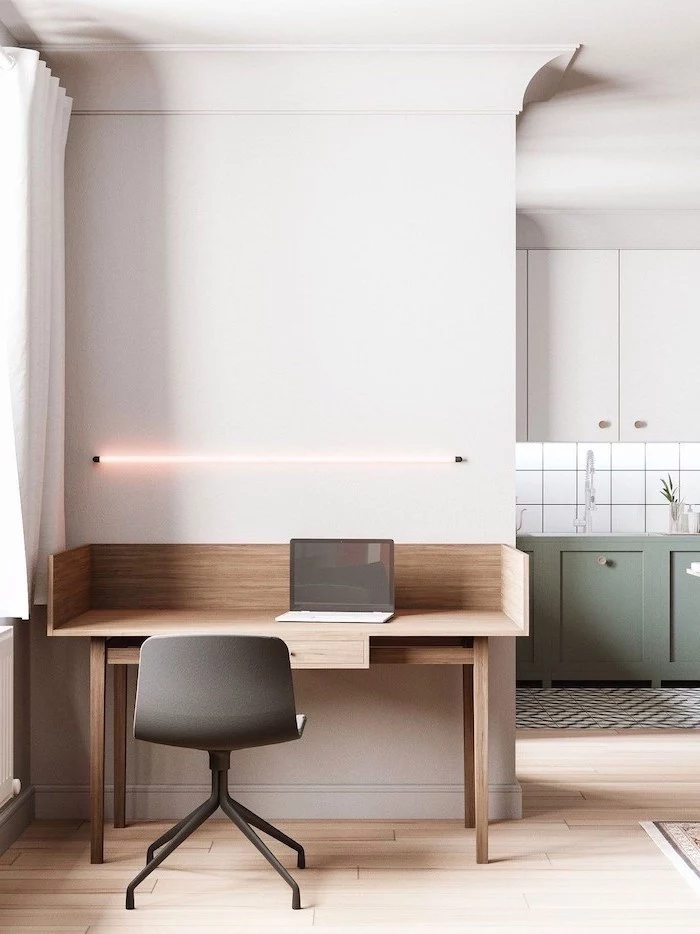
According to a survey by FlexJobs, 76% of workers said they are more productive in their home office because there are fewer distractions.
This highlights why choosing a low-traffic area is paramount. Your ability to control your environment directly impacts your output. A simple screen divider or a large plant can create a visual barrier if a separate room isn’t an option.
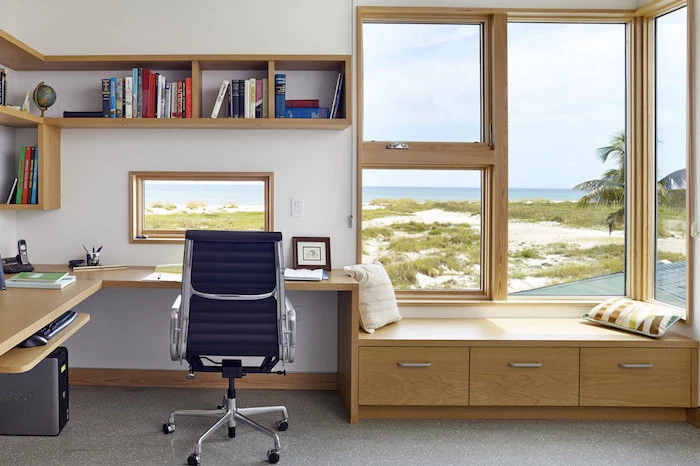
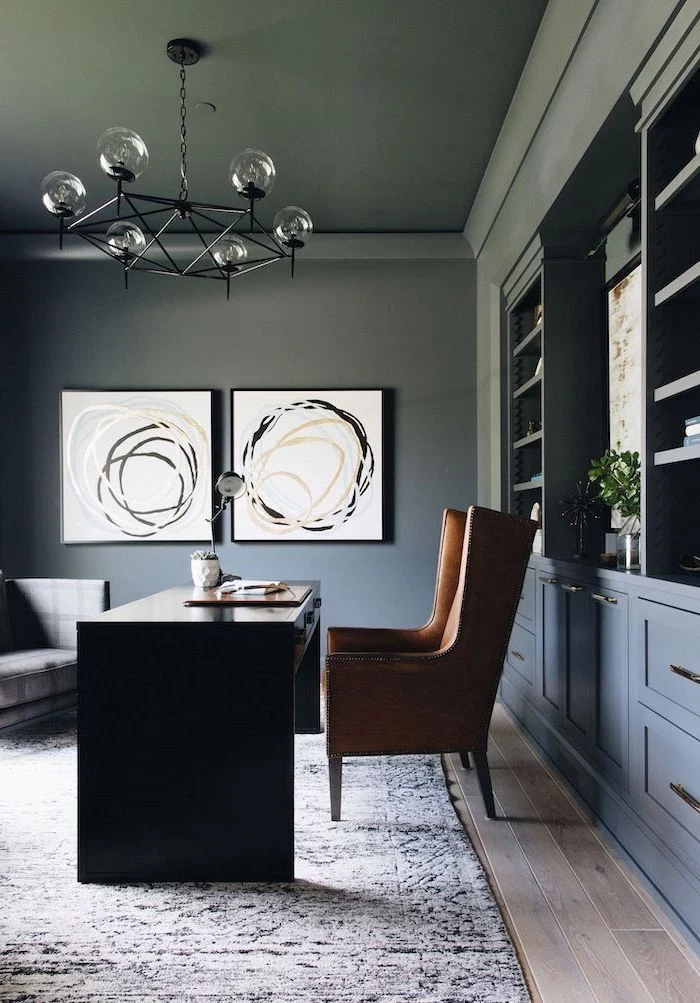
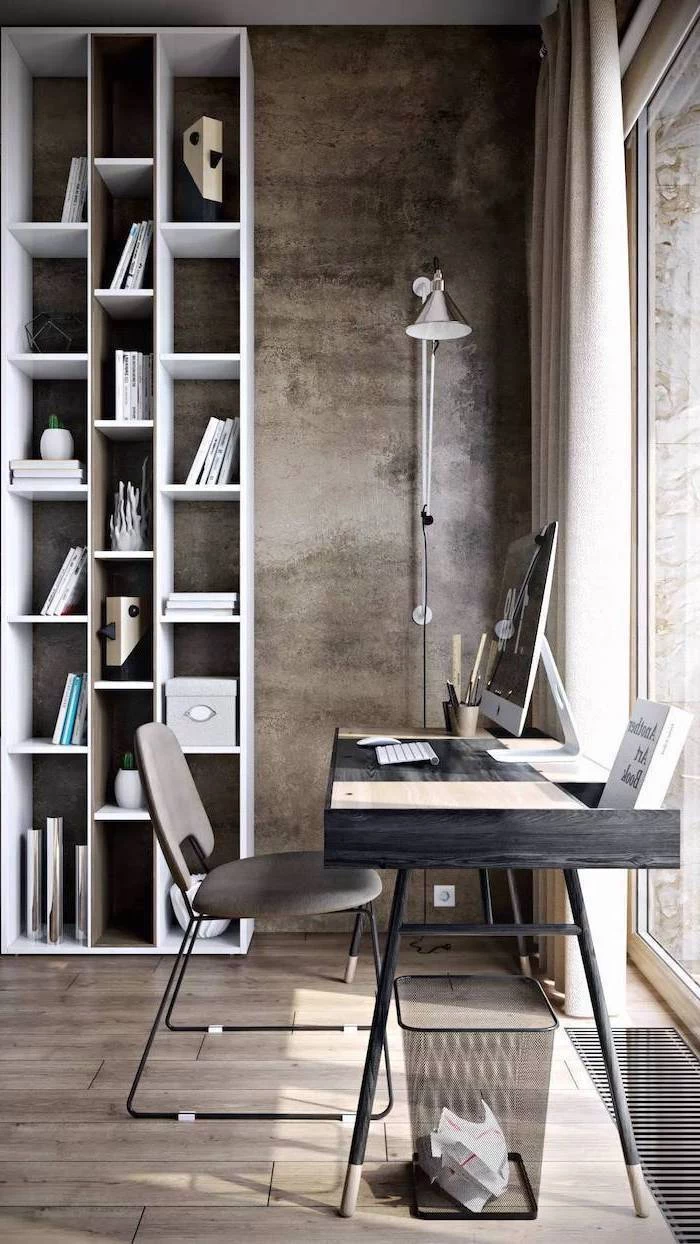
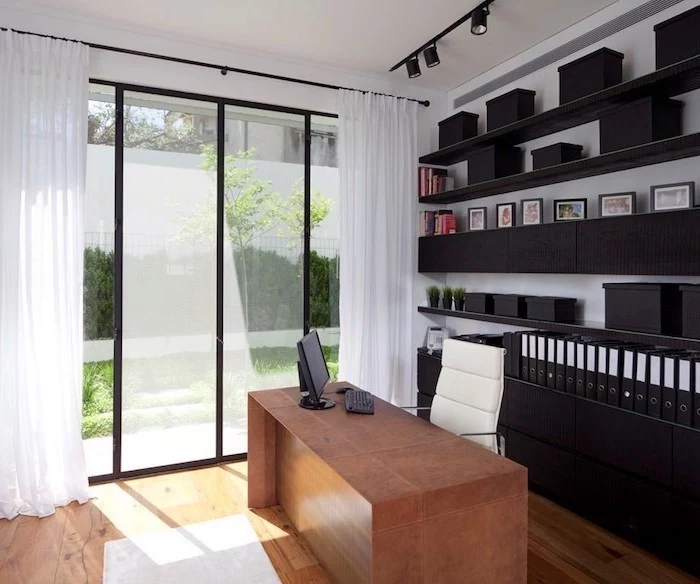
Thinking about color? Here’s a quick guide for productivity:
- Blue: Promotes calm, focus, and stable thinking. Ideal for analytical work.
- Green: Associated with balance and harmony. Great for long hours, as it’s easy on the eyes.
- Off-White/Beige: A versatile, calming neutral. Use it as a base and add pops of color with accessories.
- Avoid Bright Red: While energizing, it can also induce feelings of stress and aggression in a work context.
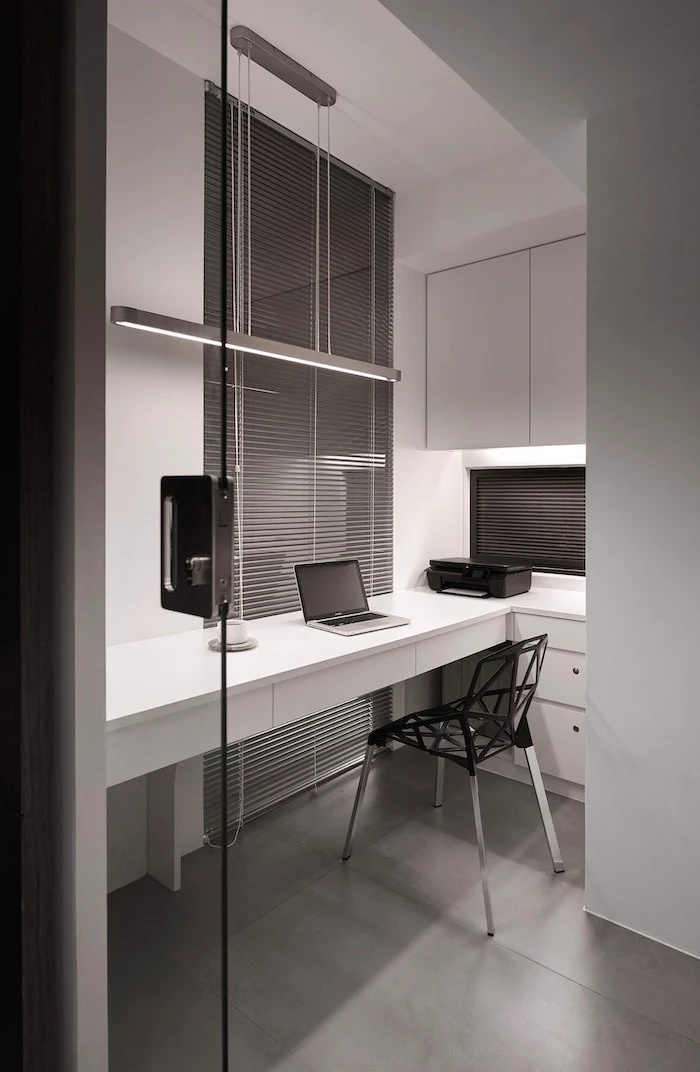
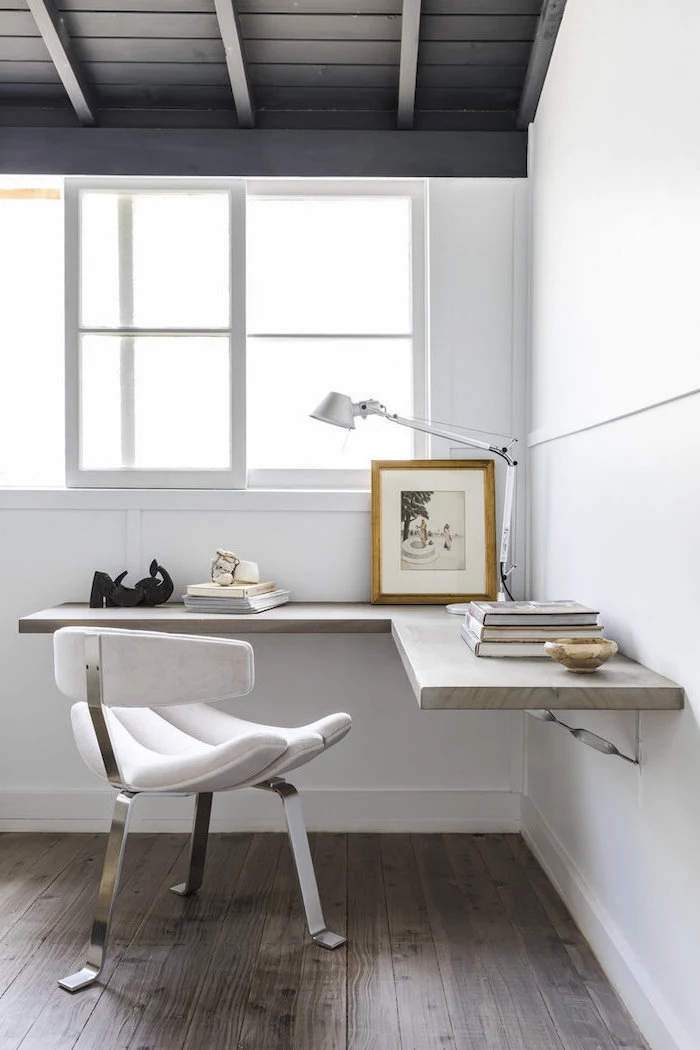
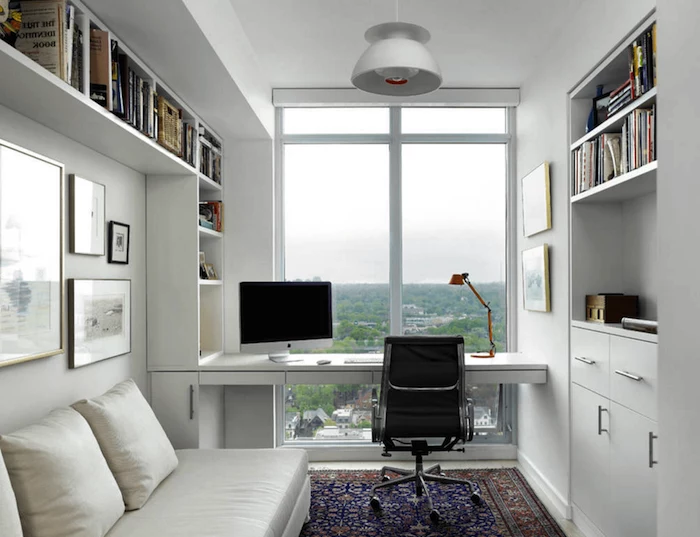
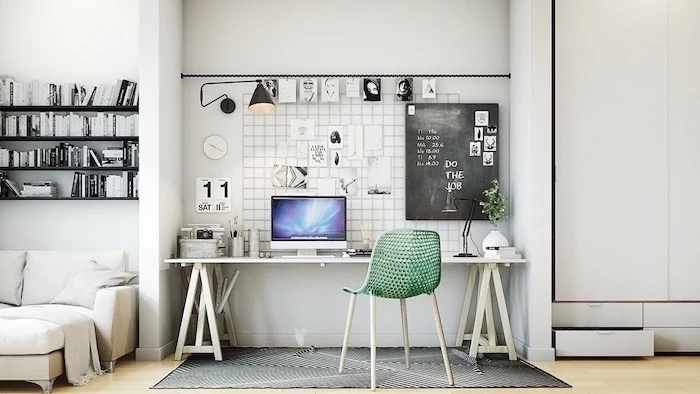
The one-touch rule: To conquer clutter, adopt a simple habit. Every item you touch—a piece of mail, a note, a report—should be dealt with immediately. File it, scan it, or trash it. Don’t let it sit on your desk to be handled later. This single change prevents piles from ever forming.
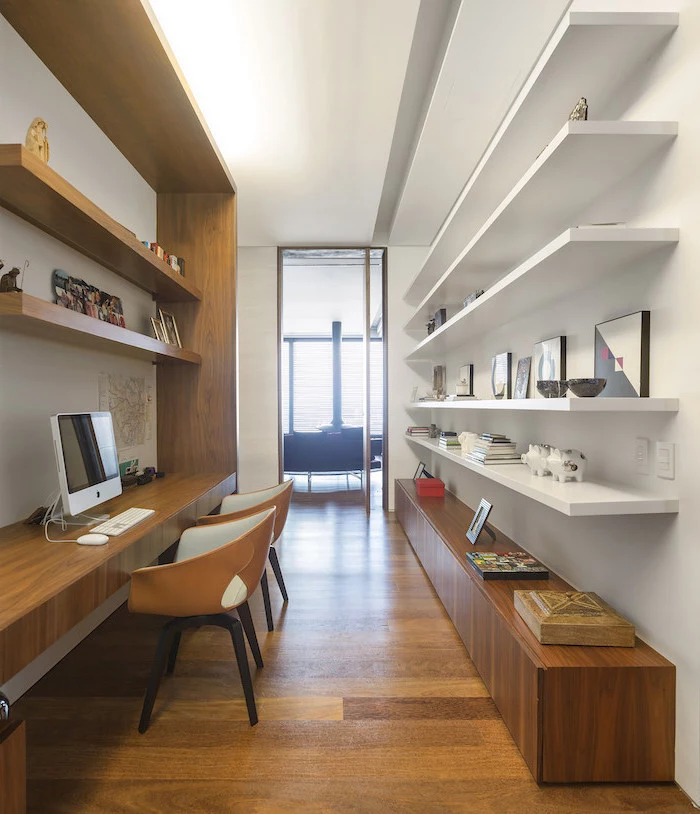
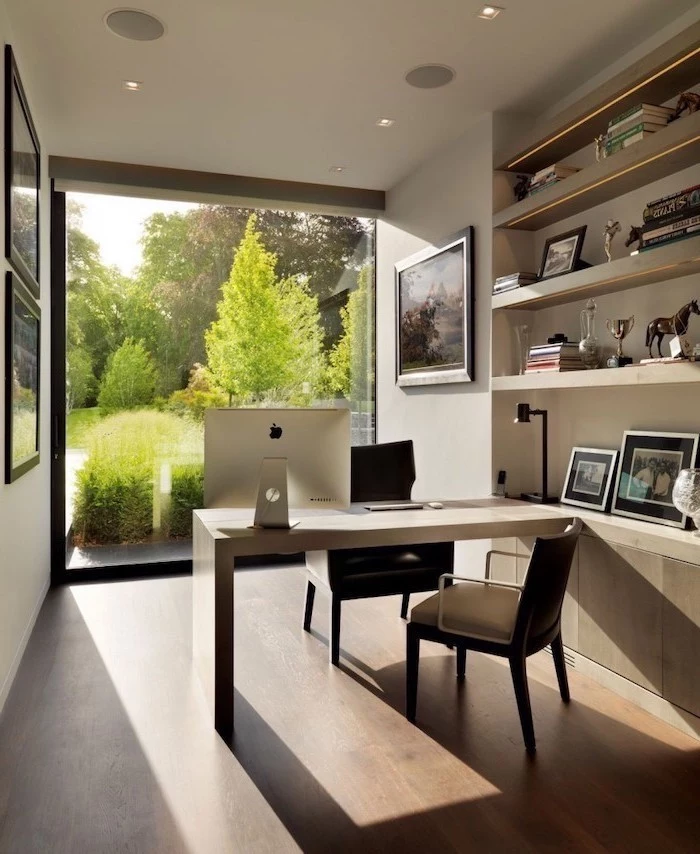
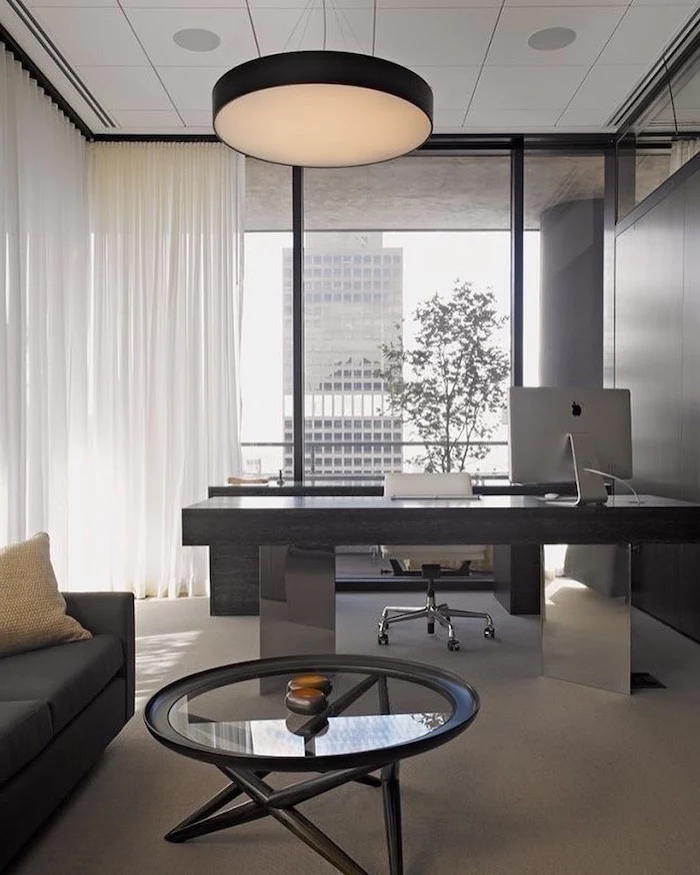
I have a tiny corner. What’s the best desk option?
Look for a
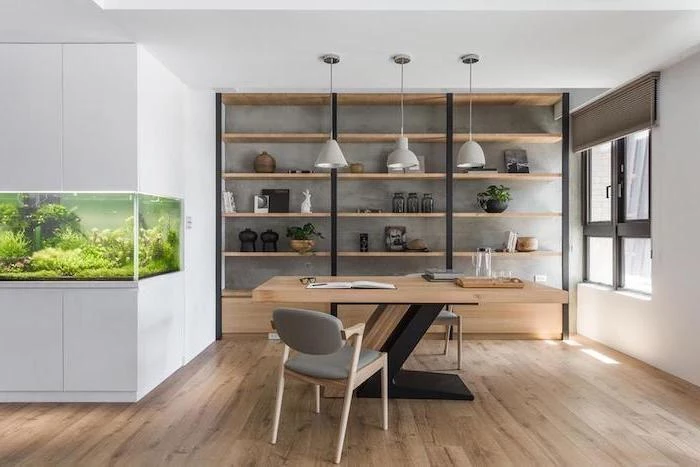
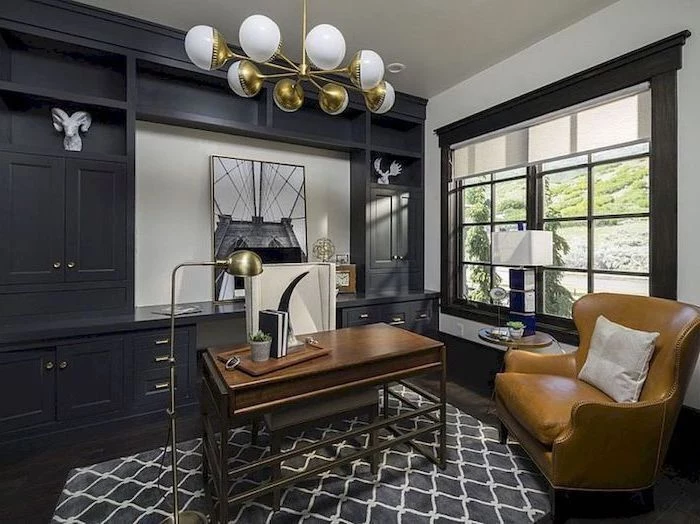
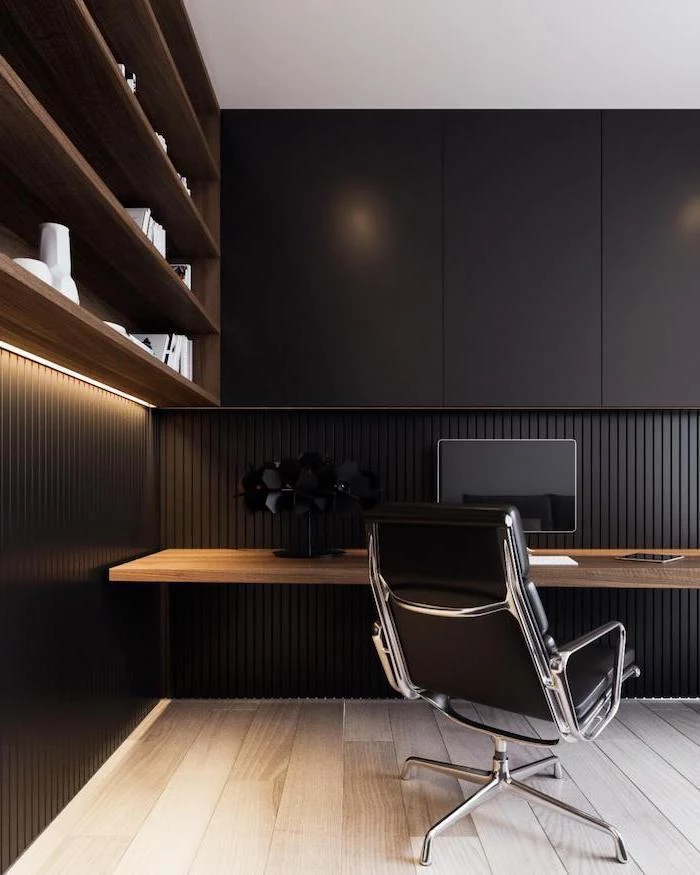
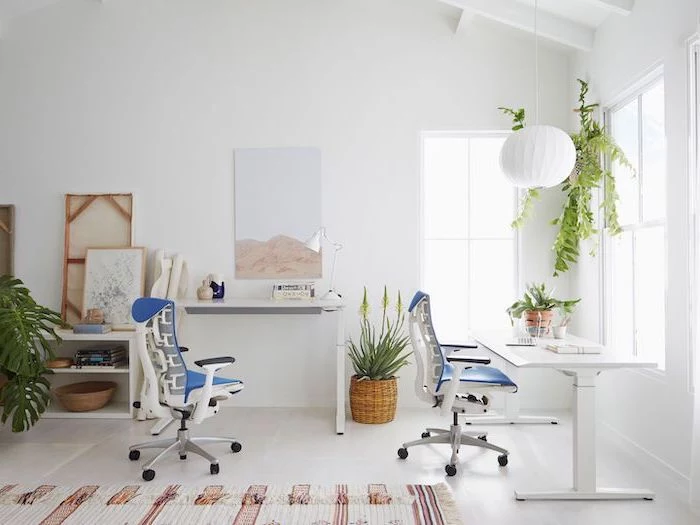
Your monitor should be an arm’s length away, with the top of the screen at or slightly below eye level. If you’re using a laptop, this is nearly impossible without help. A simple laptop stand or even a stack of sturdy books is a non-negotiable for preventing neck strain.
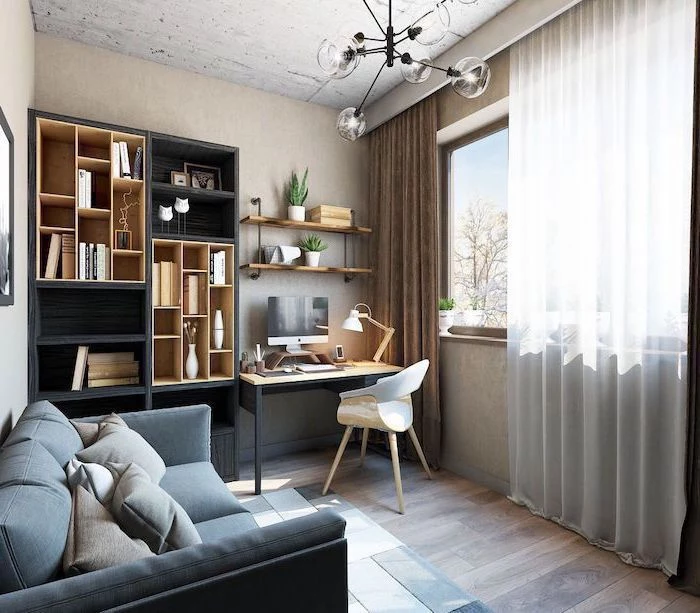
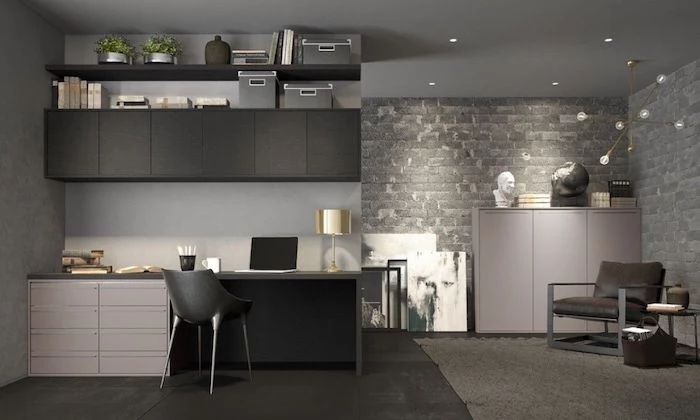
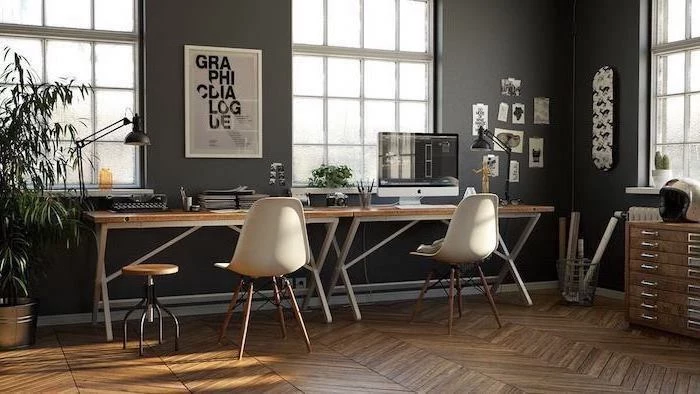
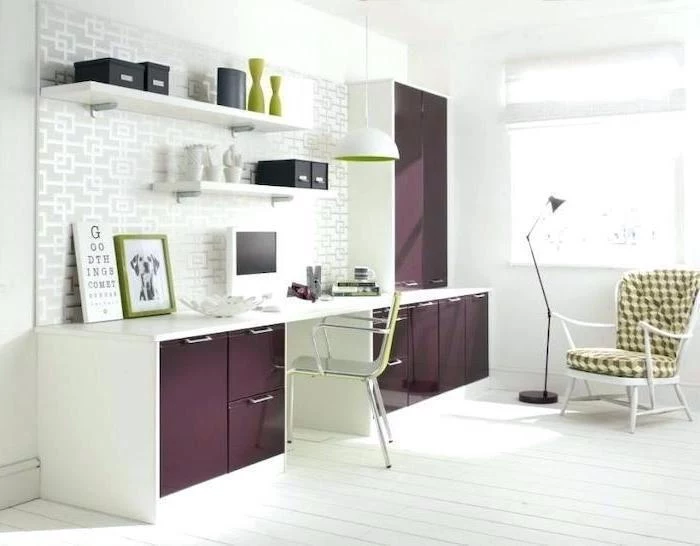
- Get your keyboard and monitor off your laptop.
- Create a dedicated charging station for all devices.
- Hide cables with a sleek cable management box.
The goal? A tech-optimized setup. A docking station can turn your laptop into a powerful desktop with a single plug, decluttering your space and streamlining your workflow instantly.
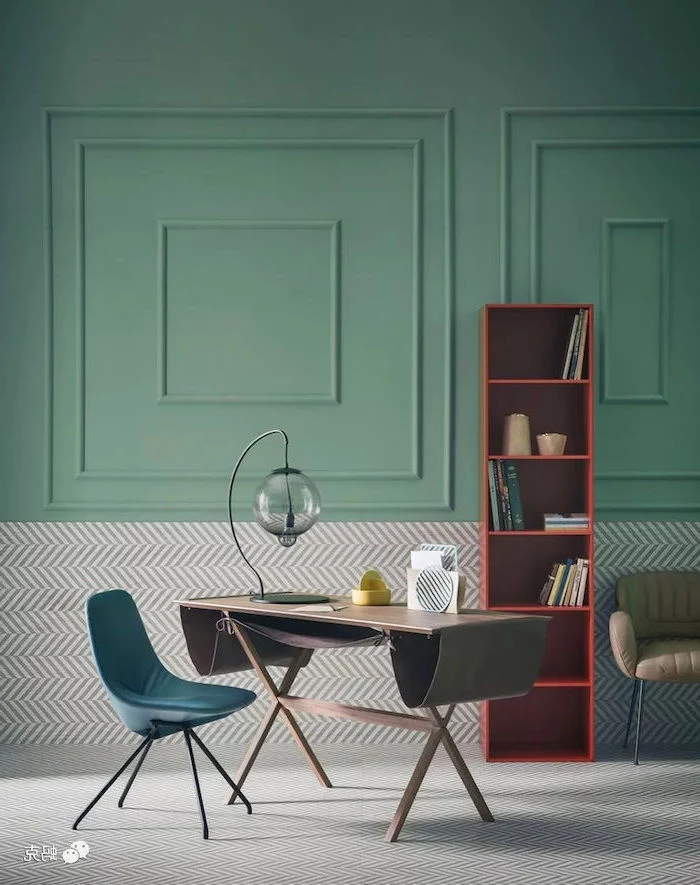
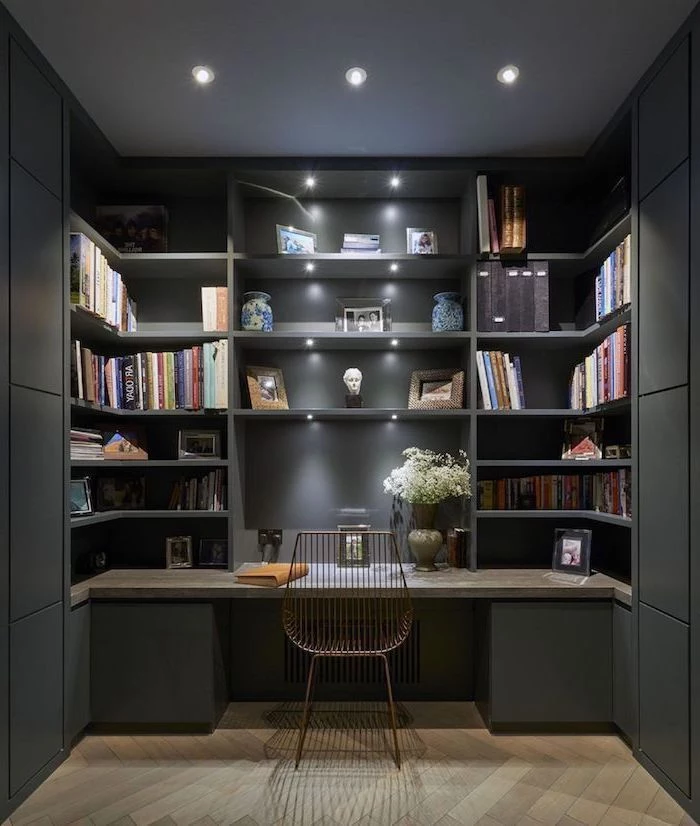
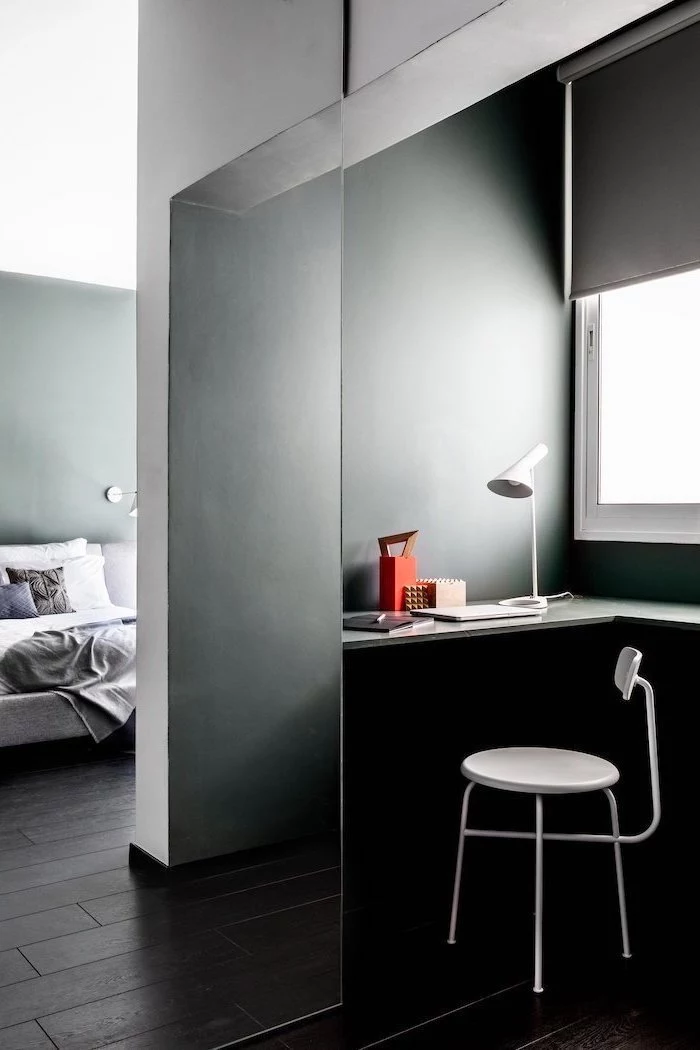
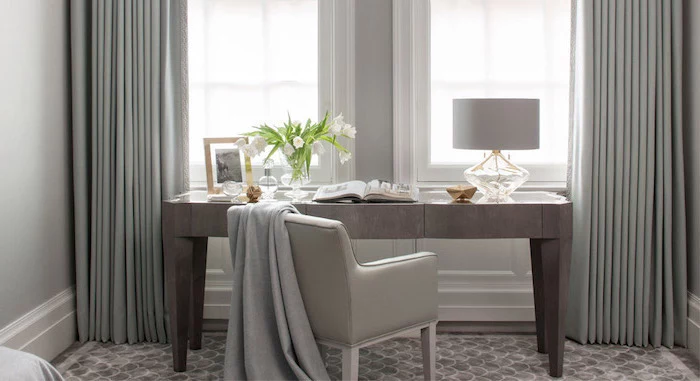
Matte Finish: A desk with a matte or non-reflective surface, like natural wood or laminate, reduces eye strain caused by glare from overhead lights or windows.
Glass Top: While stylish, a glass desk can be an ergonomic nightmare. It reflects light, shows every fingerprint, and can feel cold to the touch.
For daily, intensive work, a matte finish is the superior choice for visual comfort.
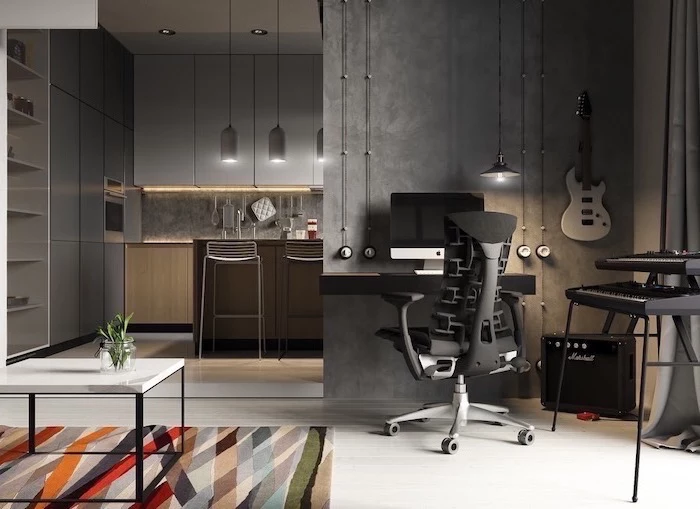
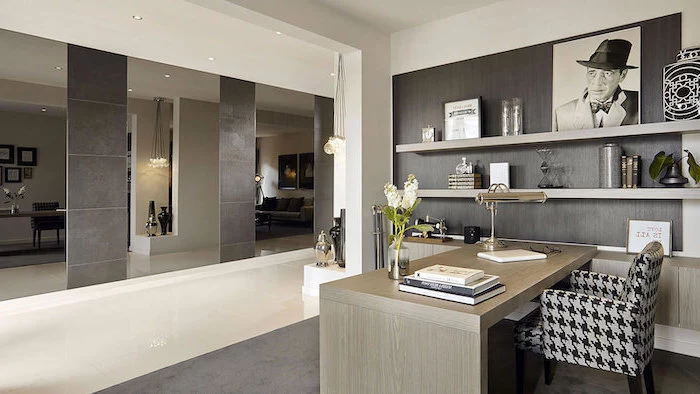
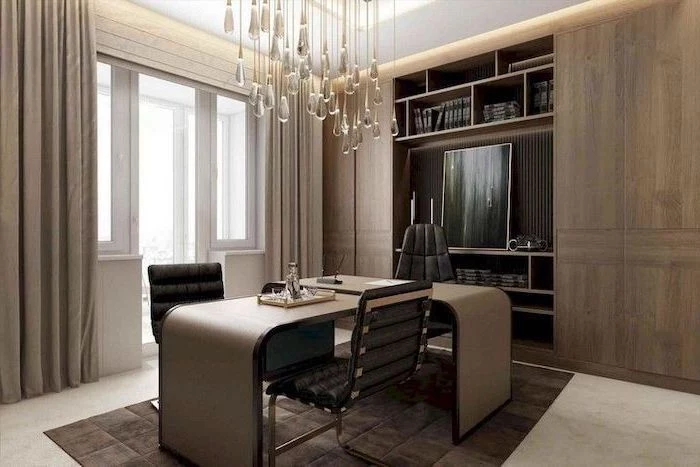
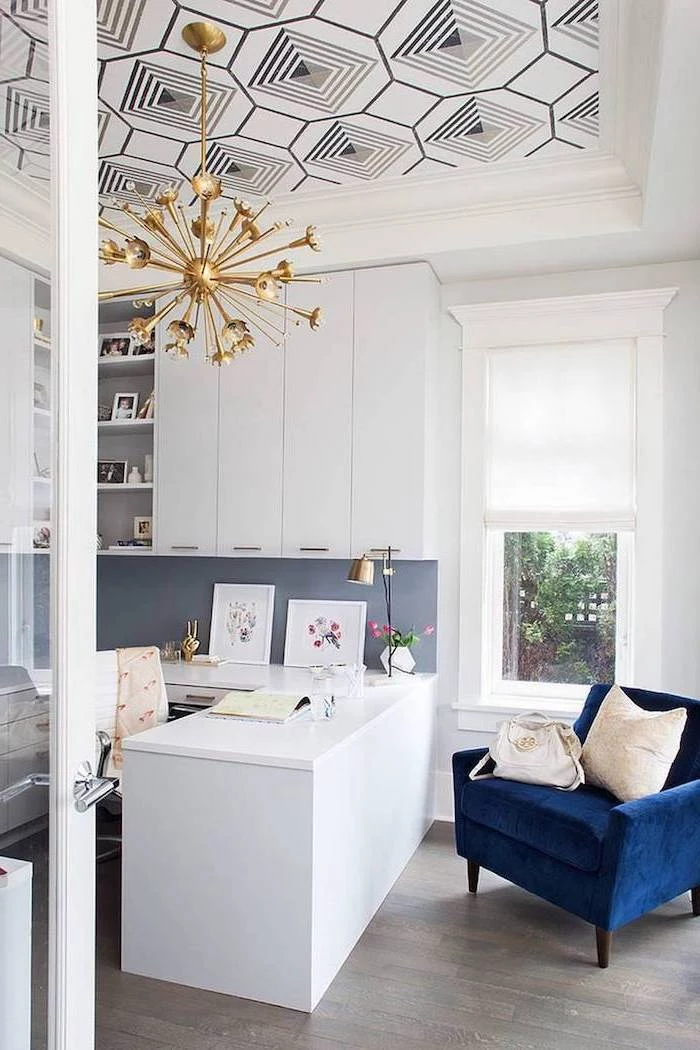
Bring nature in. It’s called biophilic design, and it’s proven to reduce stress and increase creativity. You don’t need a jungle; a single, easy-care plant like a Snake Plant or a ZZ Plant can make a world of difference. They require minimal light and watering, making them perfect office companions.
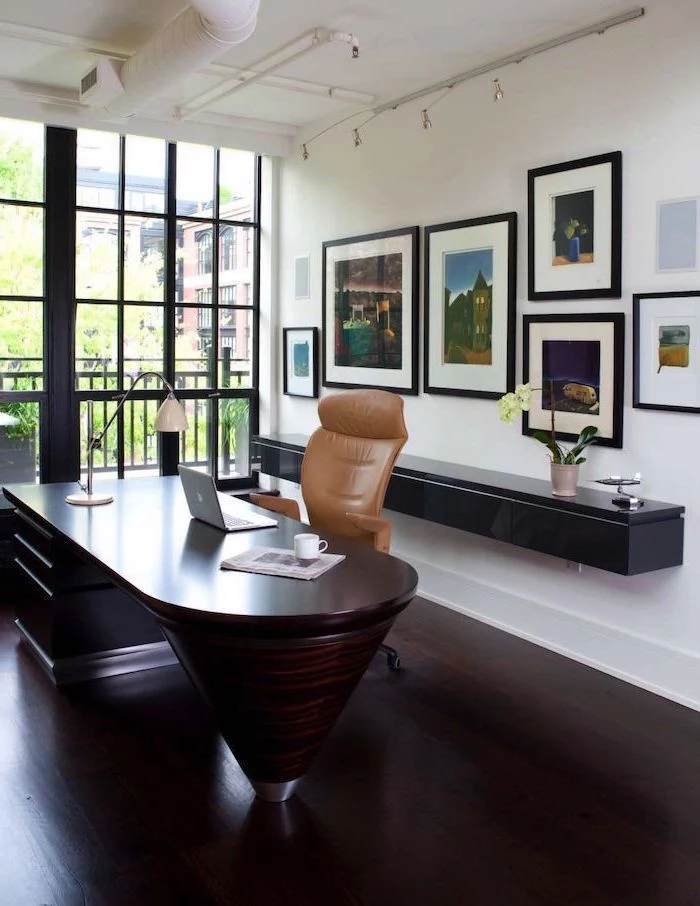
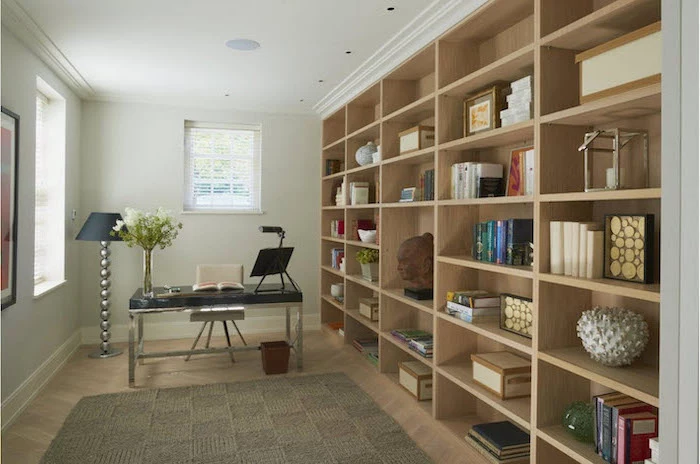
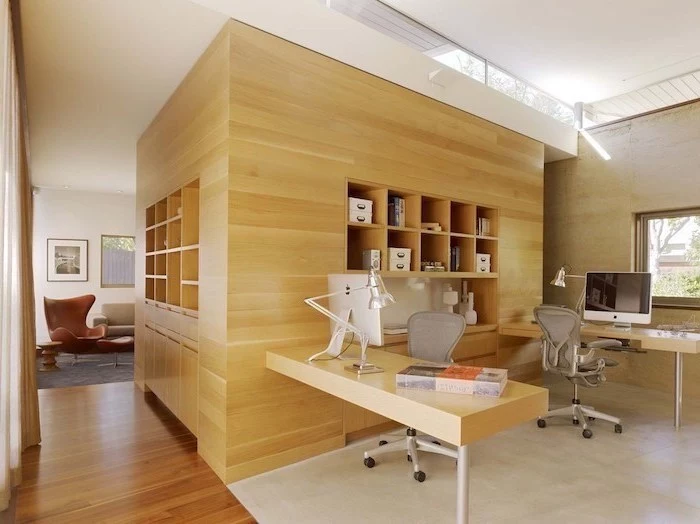
My office feels sterile. How do I add personality without creating clutter?
Use a single, large piece of art as a focal point behind your desk. It commands attention, adds a splash of color and personality, and serves as a great background for video calls. Unlike scattered small trinkets, one impactful piece looks intentional and sophisticated, not messy.
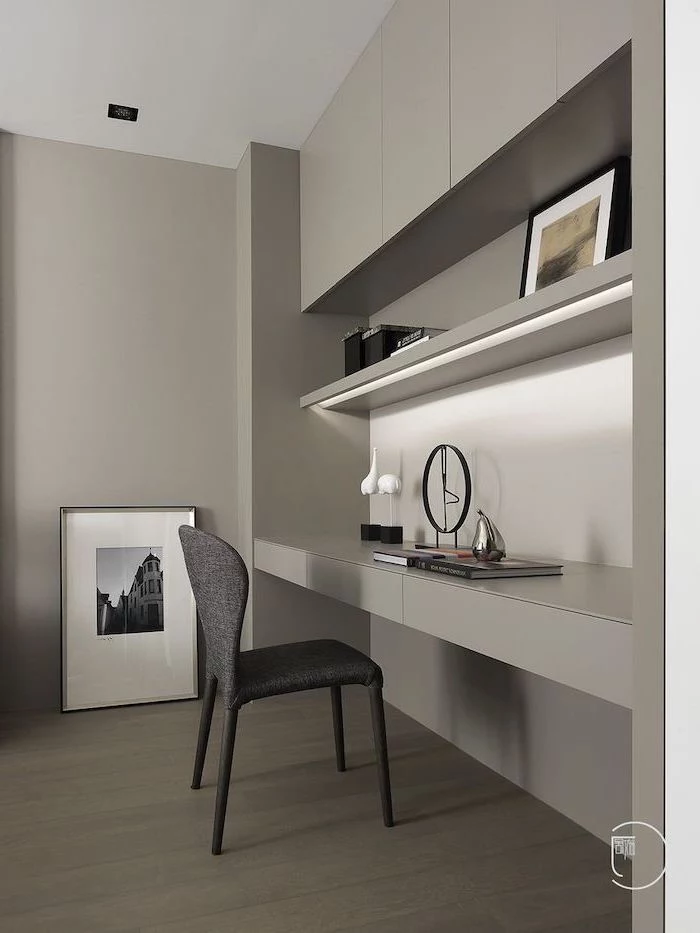
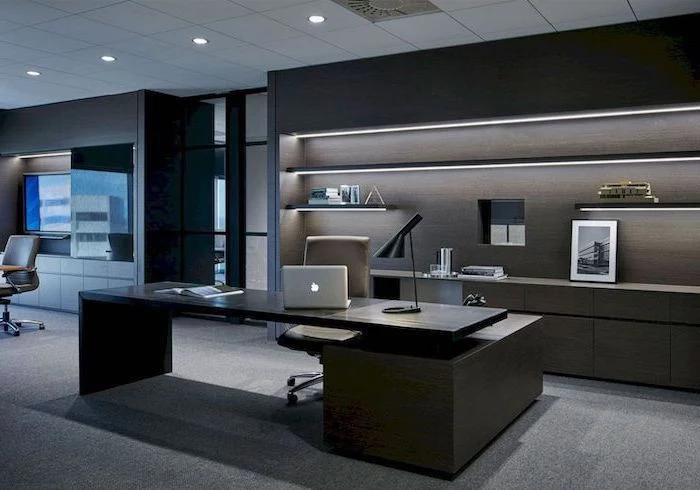
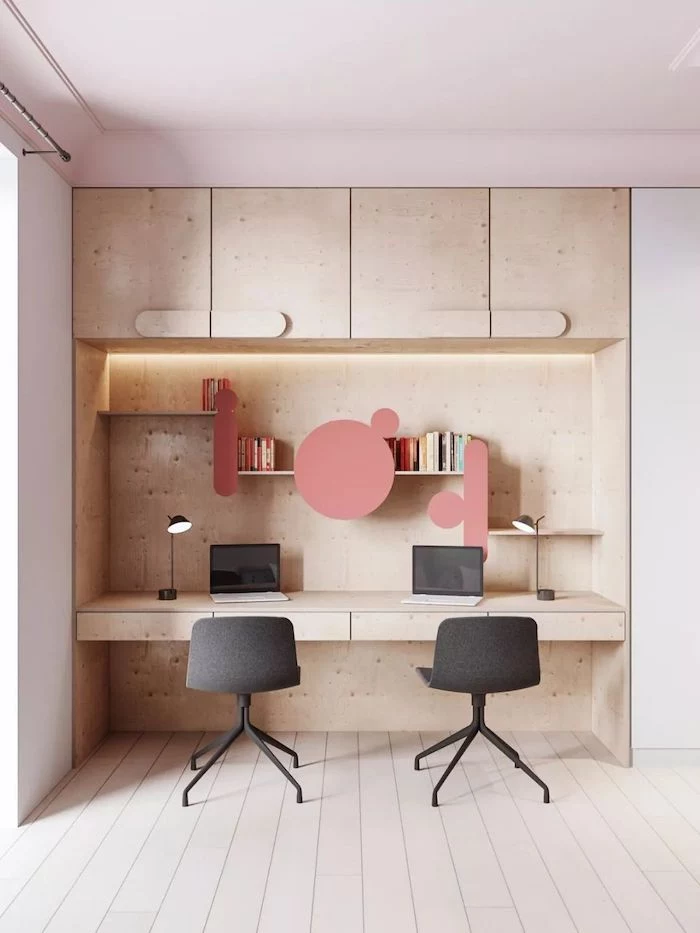
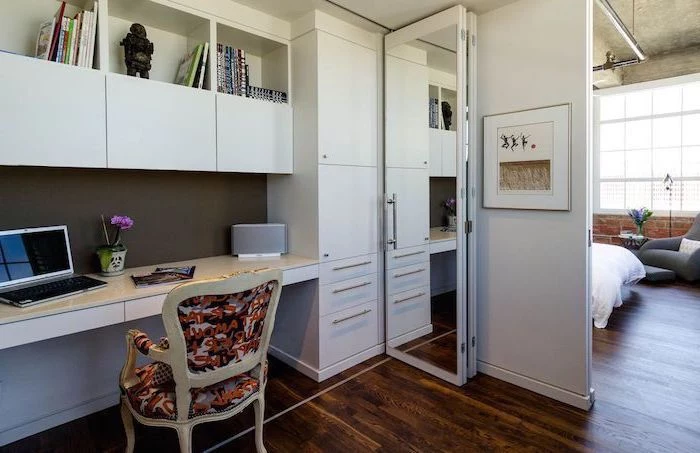
Task lighting is key: Your room’s overhead light isn’t enough. It creates shadows and causes your eyes to work harder. A dedicated, adjustable desk lamp with a warm white bulb (around 2700K-3000K) allows you to direct light exactly where you need it, reducing fatigue during focused work.
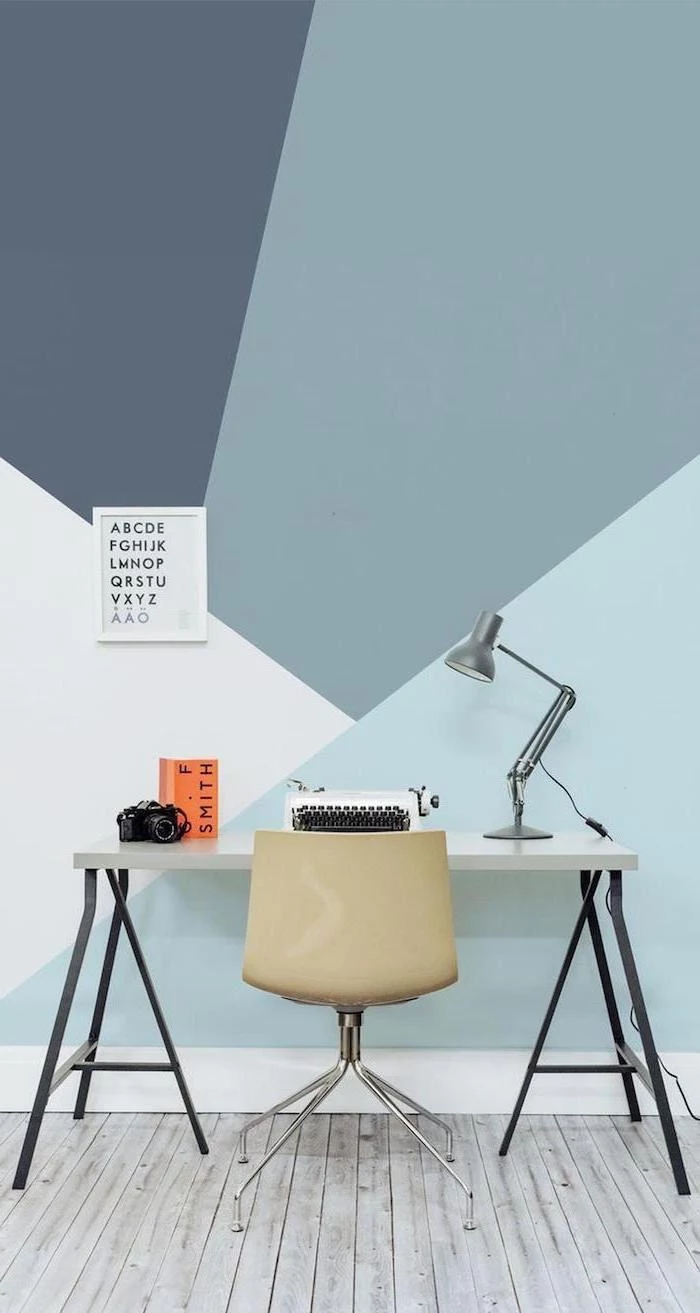
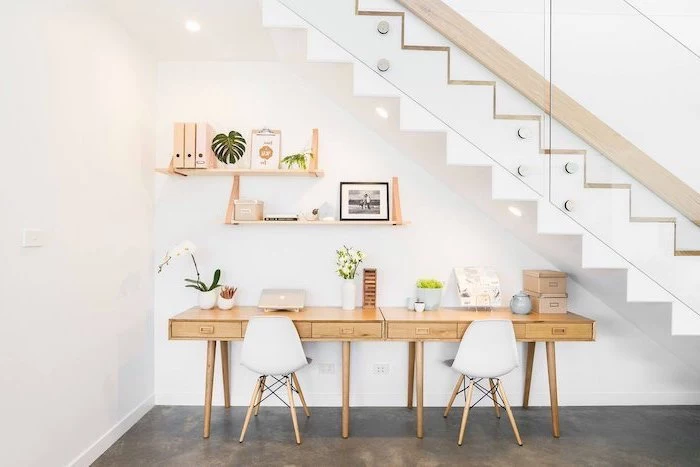
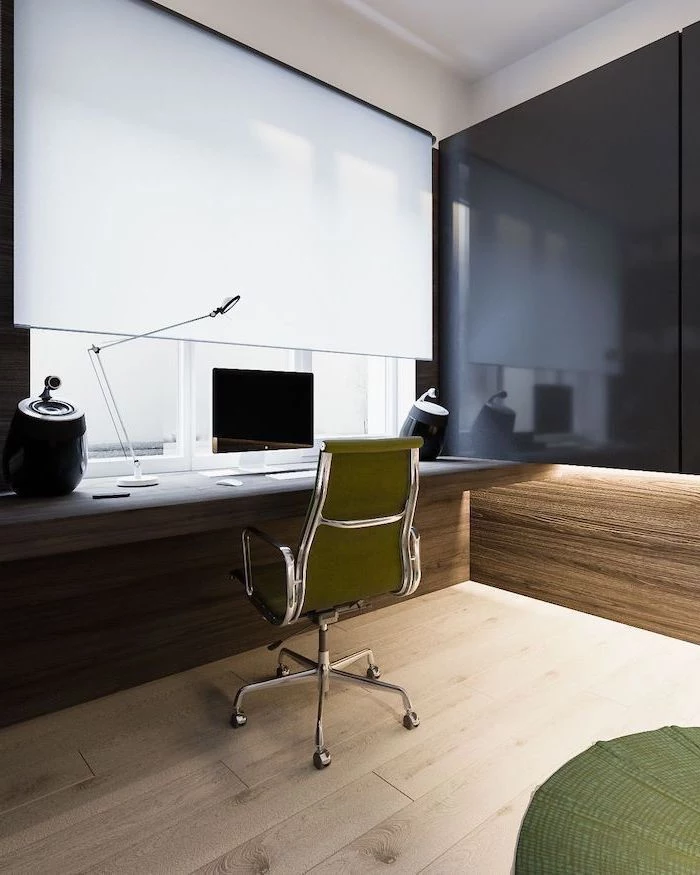
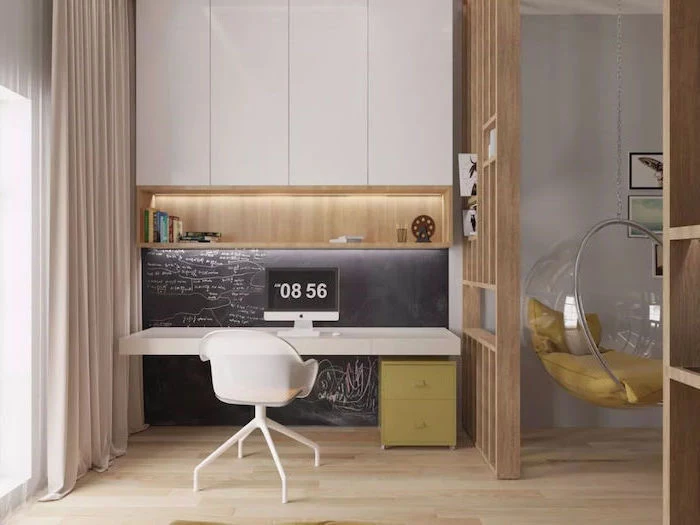
Fact: The average US office worker spends nearly 7 hours a day in front of a screen.
This statistic underscores why ergonomics aren’t a luxury; they’re a necessity for long-term health. Investing in a proper chair, monitor position, and keyboard setup is a direct investment in your physical well-being and career longevity.
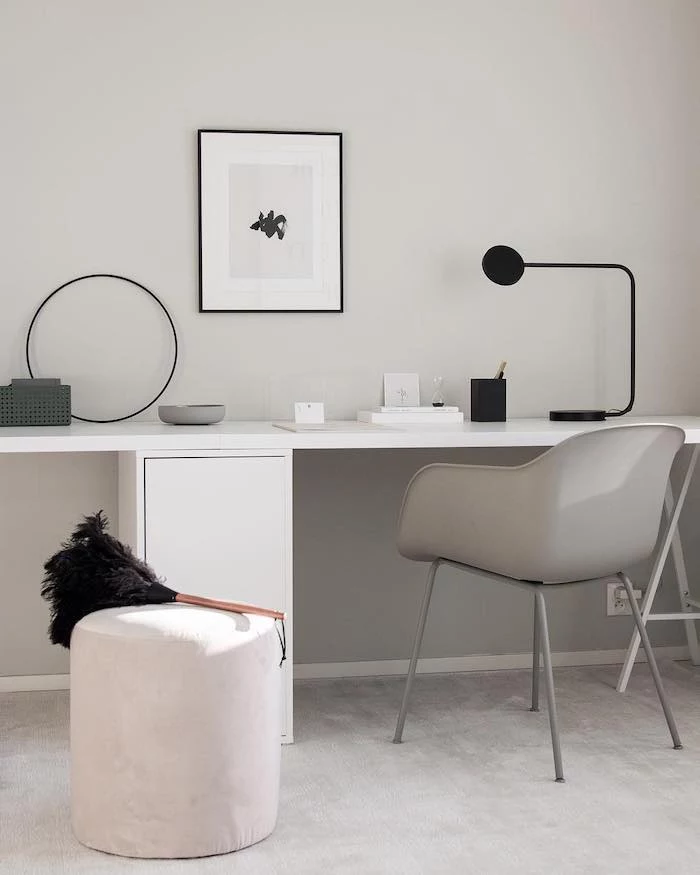
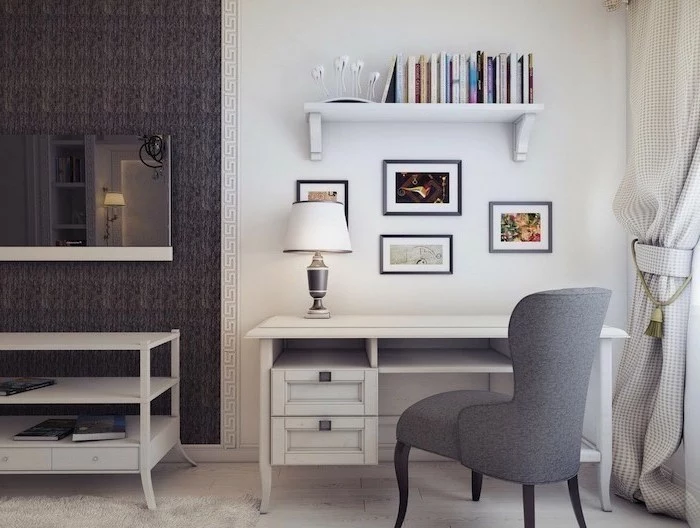
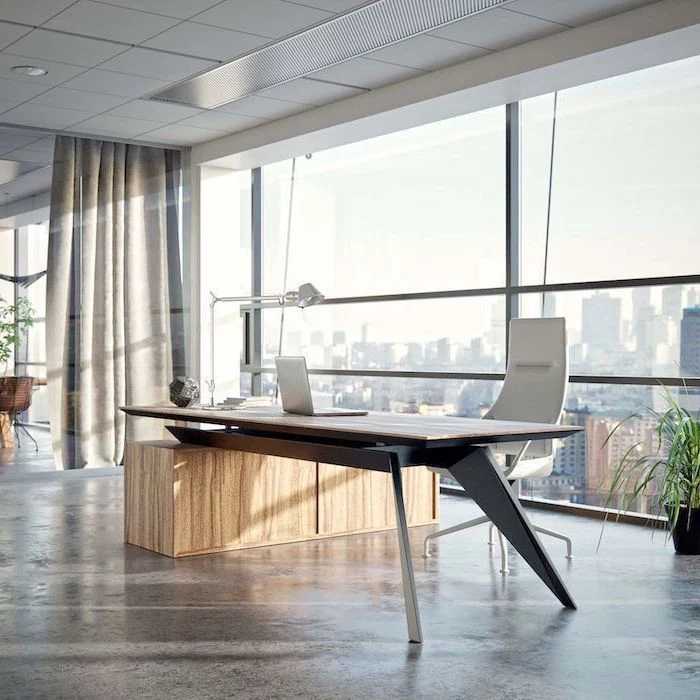
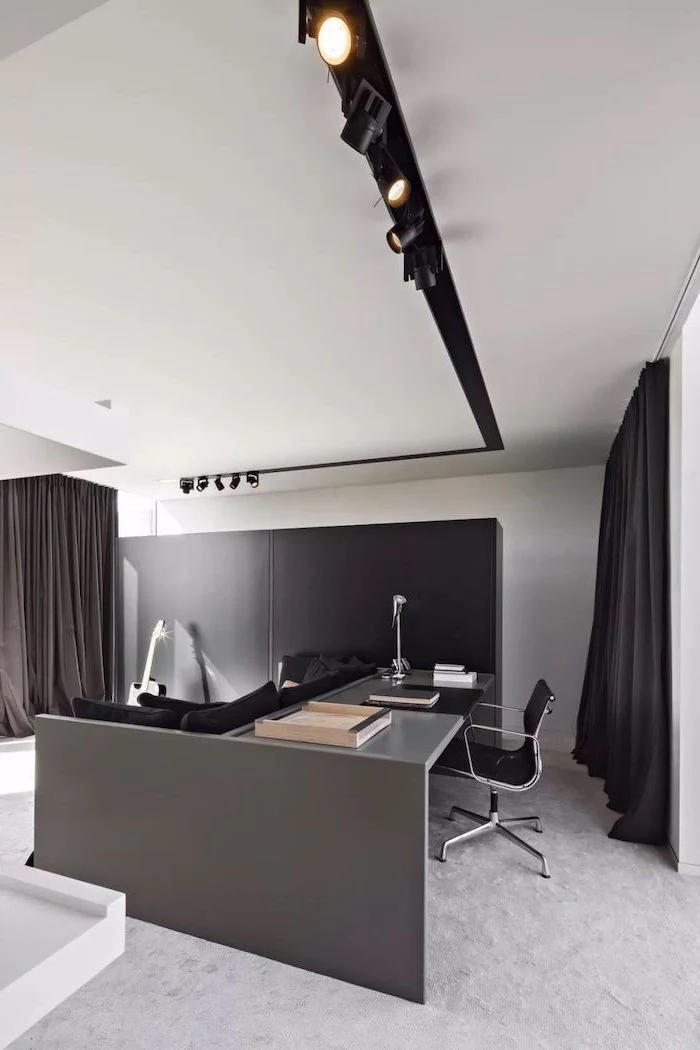
For the ultimate space-saving solution, consider the
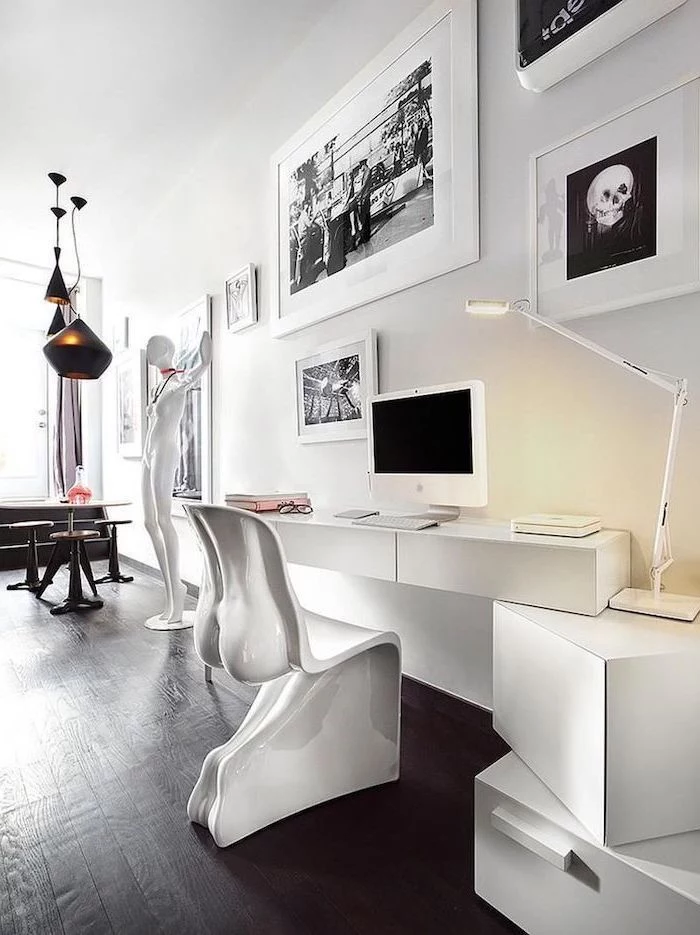
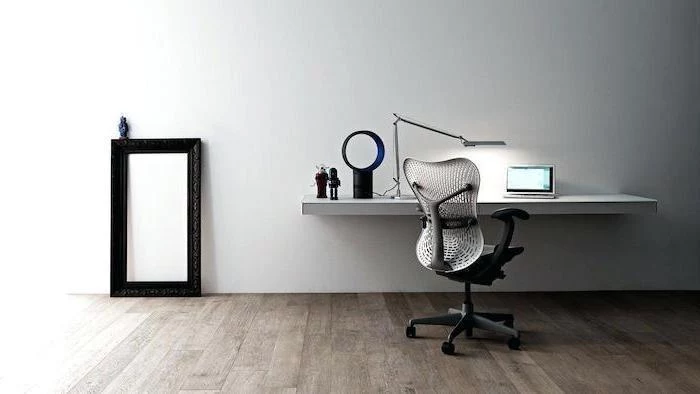
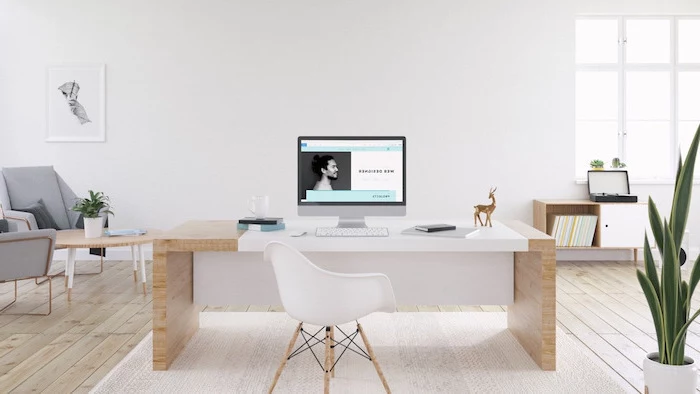
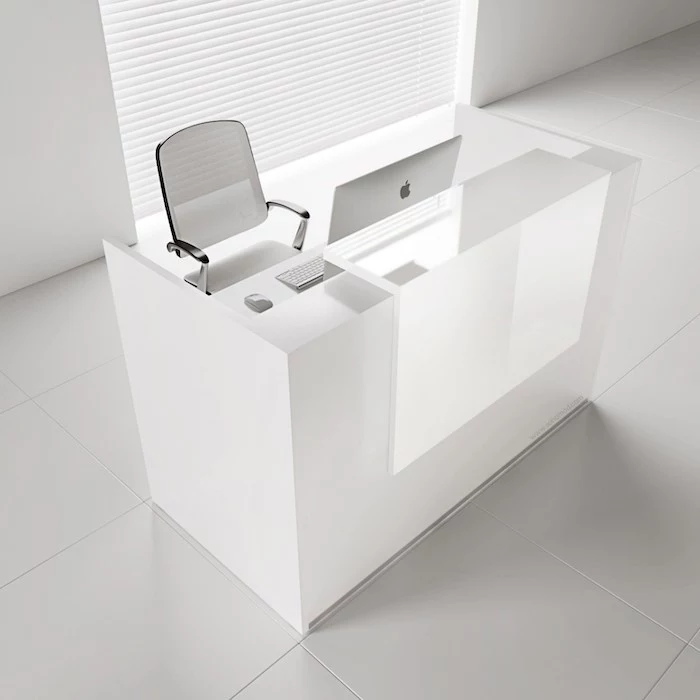
- A clean, organized desk at the end of each day.
- An easy start to the next morning with no clutter to clear.
The secret is a ‘shutdown ritual.’ Spend the last five minutes of your workday tidying up, filing loose papers, and wiping down your desk. It provides a clear mental end to your day and sets you up for success tomorrow.
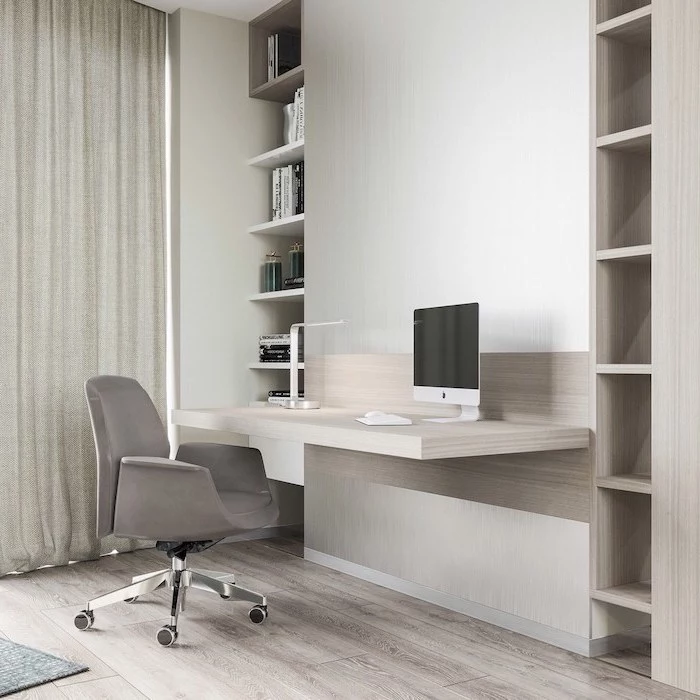
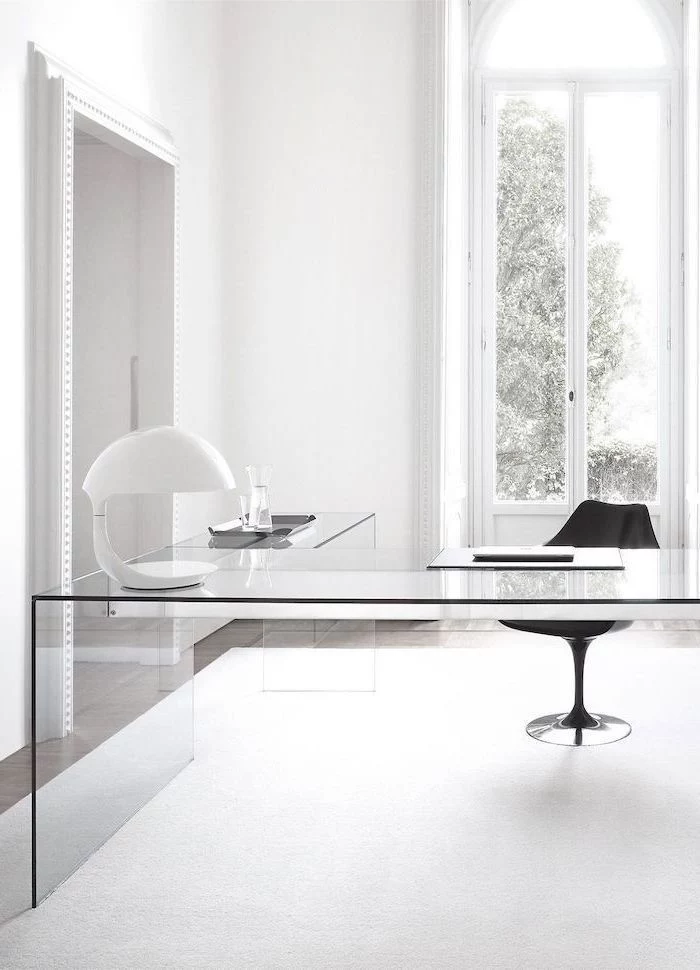
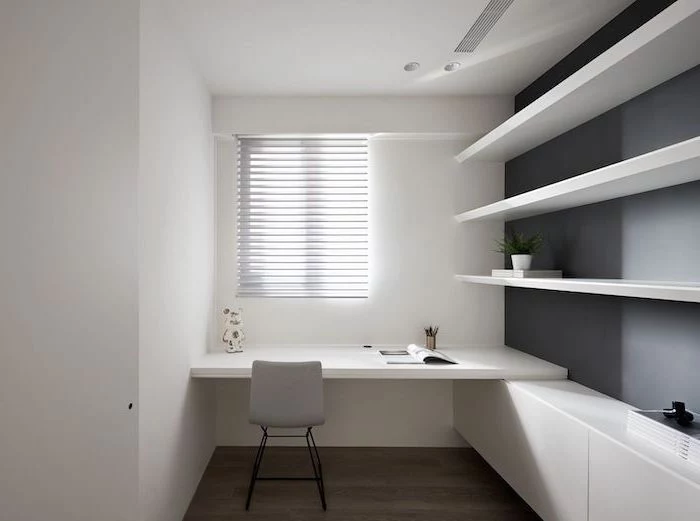
DIY Inspiration: Create a high-end look on a budget. Take a simple IKEA KARLBY kitchen countertop (in walnut or oak) and place it on top of two ALEX drawer units. You get a massive, durable, and beautiful desk with integrated storage for a fraction of the cost of a designer piece.
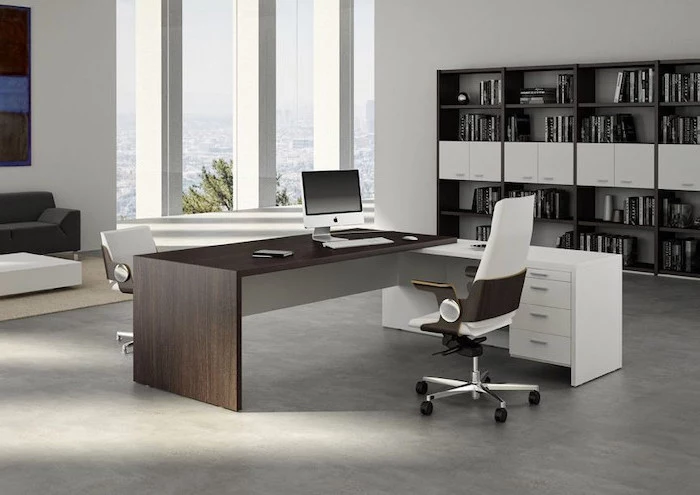
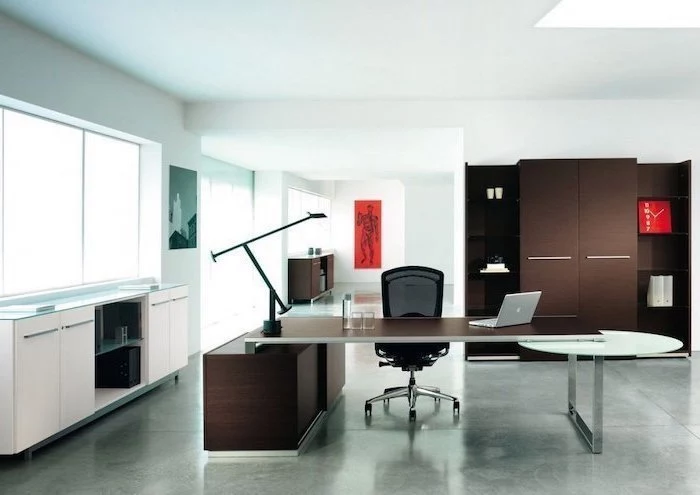
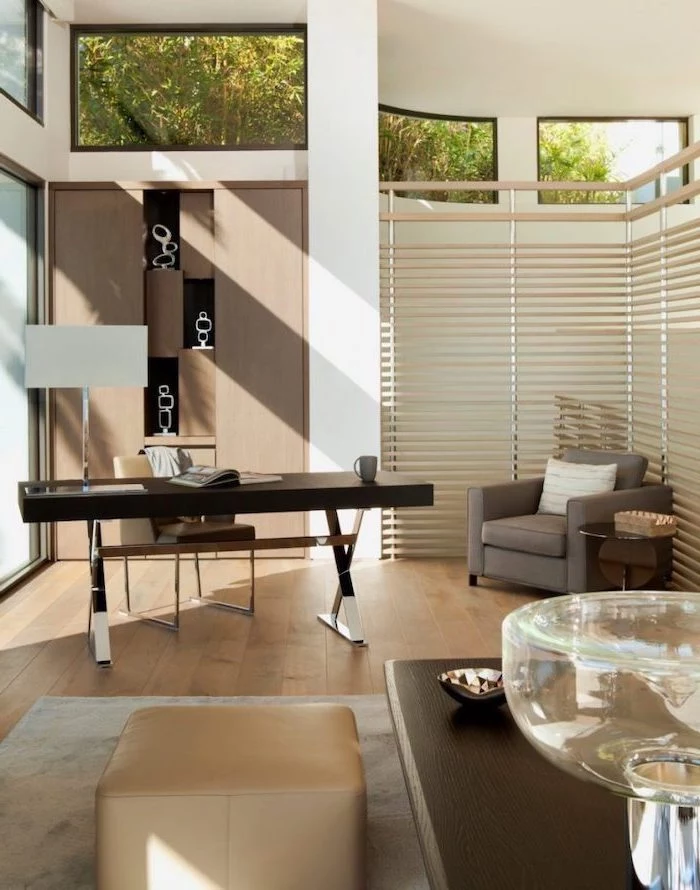
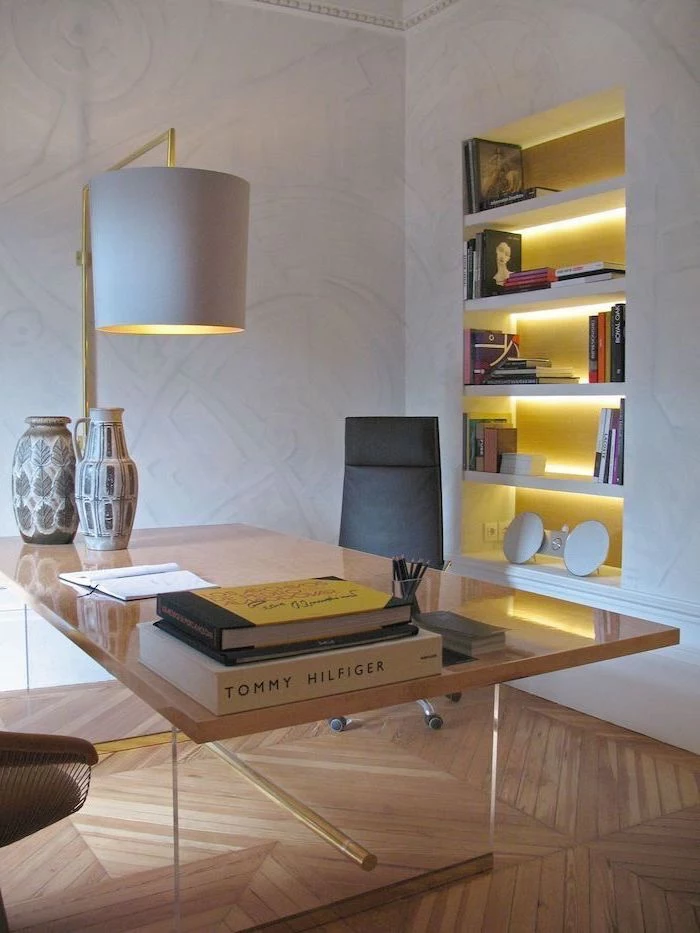
Standing desk or regular desk?
Why not both? An adjustable-height desk is the ideal solution. Brands like Fully or Uplift Desk offer models that let you switch between sitting and standing with the push of a button. This allows you to combat the negative effects of sitting all day while still having a comfortable seated option when you need to focus deeply.
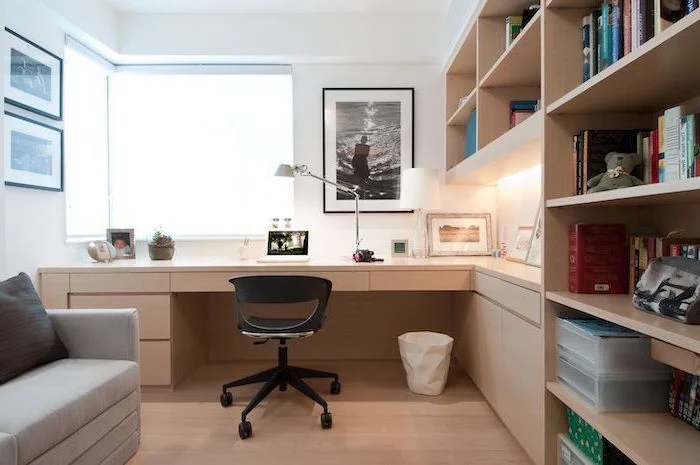
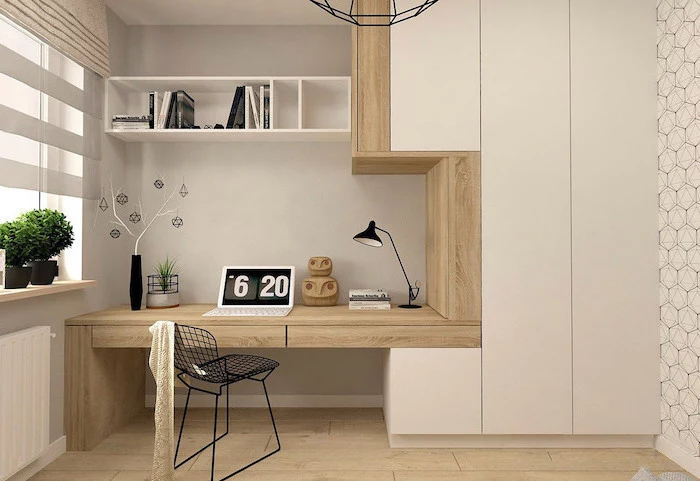
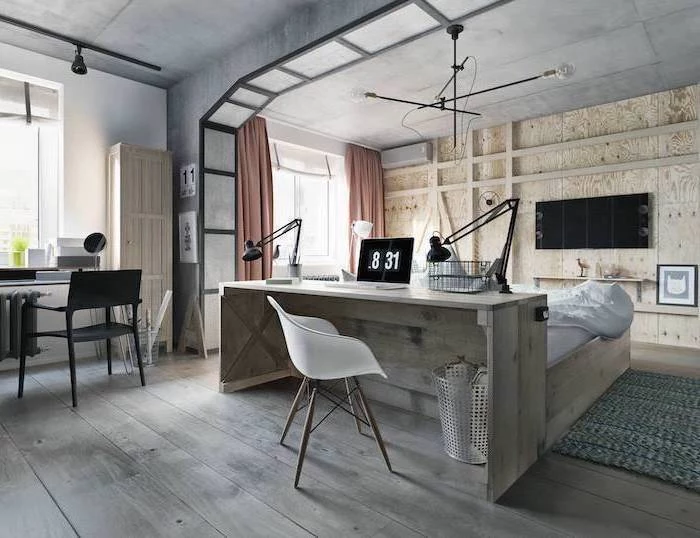
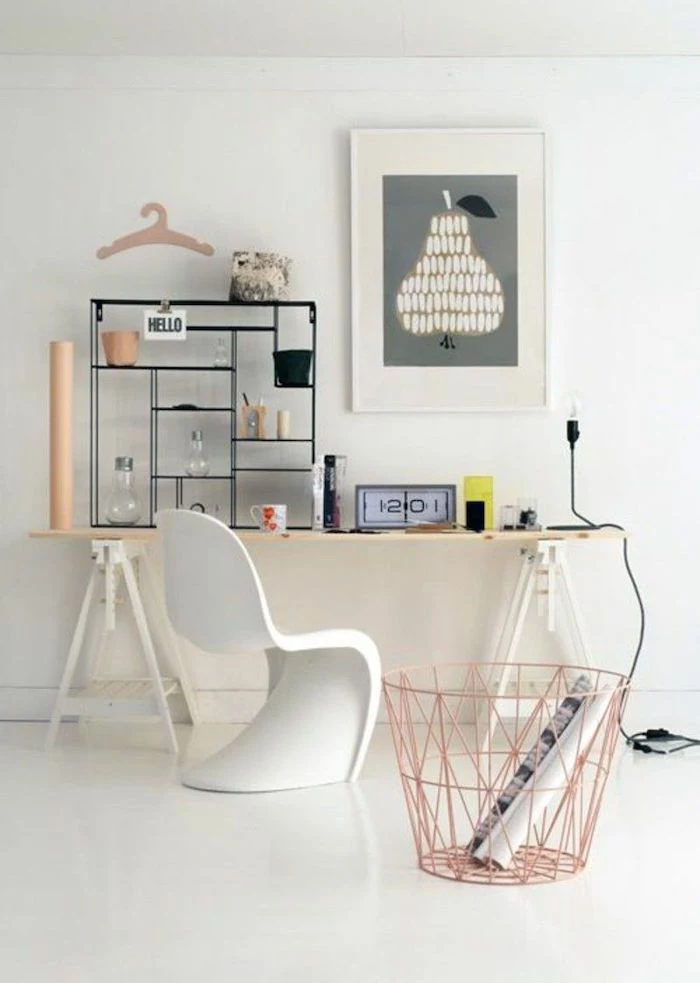
Don’t forget scent: Our sense of smell is strongly linked to memory and mood. Use a diffuser with scents like peppermint or lemon for alertness, or lavender and sandalwood to create a calm, focused atmosphere. It’s a subtle but powerful way to define the feeling of your workspace.
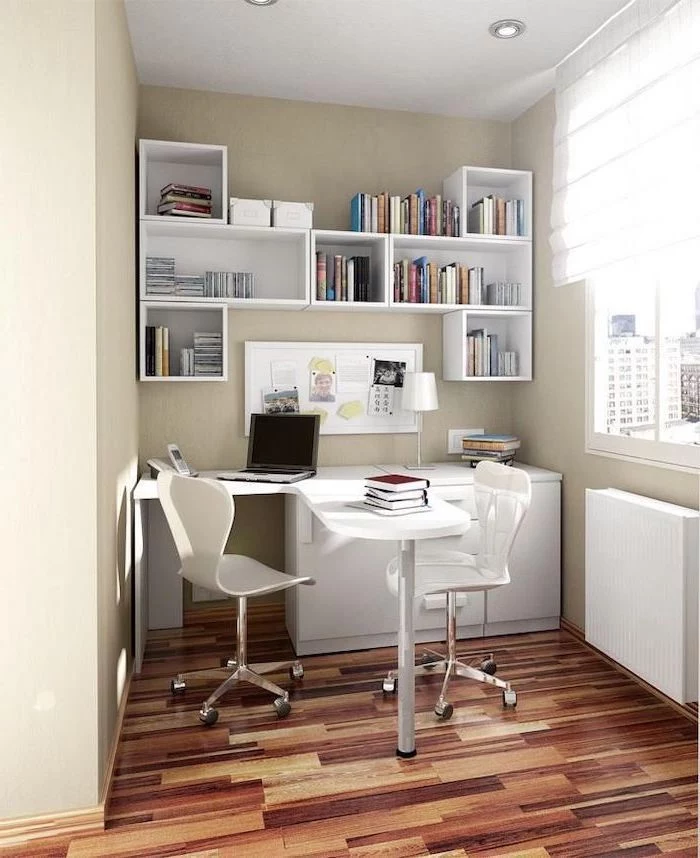
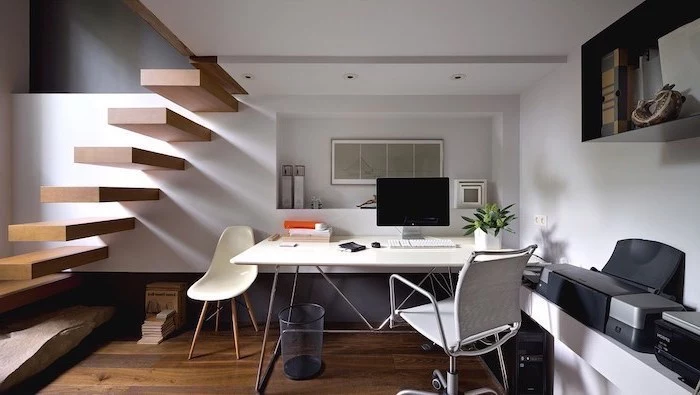
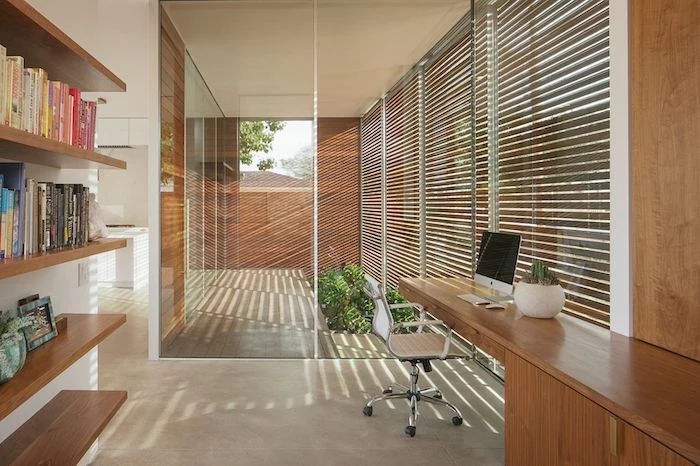
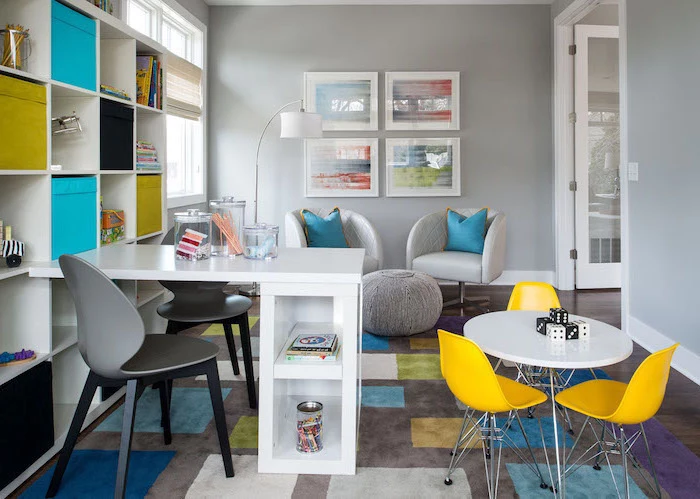
In a survey on remote work, 40% of people said having a dedicated home office was the biggest challenge.
This shows that the struggle to carve out a functional space is universal. The key is to shift your mindset: it doesn’t need to be a full room, just a dedicated *zone*. Even a well-organized corner, consistently used only for work, can be incredibly effective.
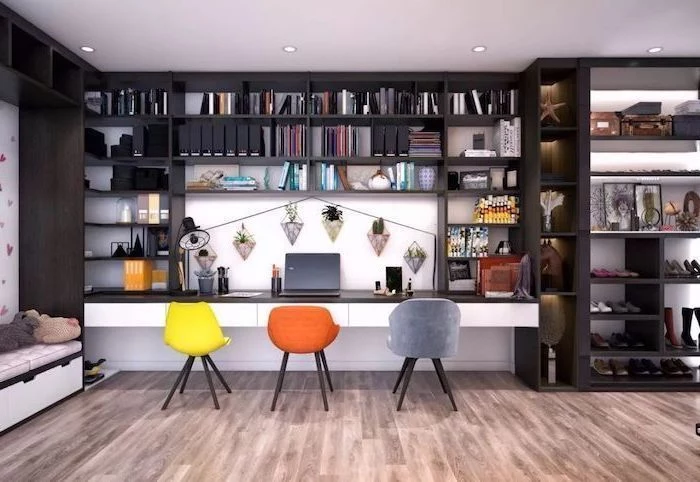
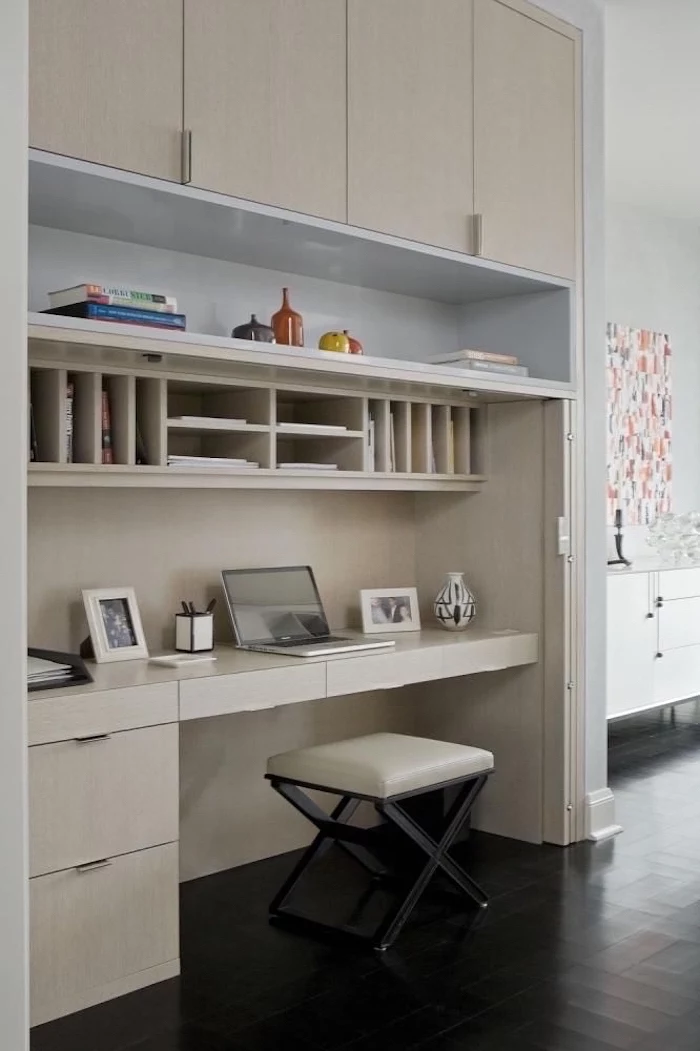
Upgrade your storage game by thinking like a librarian. Use magazine files to vertically store notebooks and thin binders. Label everything clearly. A Dymo label maker is a small investment that pays huge dividends in organization. When everything has a designated, labeled home, you’ll never waste time searching for a document again.

